More and more countries are now giving digital nomad visas, and it’s happening fast. This change is all about how people work and travel, and it started because of the Covid-19 pandemic.
Now, we can see this change everywhere, especially in how people travel for fun and how they do their jobs.
Here’s the big deal: Many companies are letting their employees work from home, and they (we) think this will continue for a long time. It’s all about keeping people safe and giving them more freedom.
People really want to work from different places and explore new things (places) while they work. This is where countries come in. They also want more visitors and workers, and they’re ready to make it easy for people (you) to work and explore at the same time. The process to make this possible is through a “Digital Nomad Visa.”
And there are currently about 58 countries that are part of this trend. They want to make it simple for you to go on a ‘workation’ – that’s a mix of work and vacation. But before we dive into which countries these are, let’s understand what a digital nomad visa actually means.
Ready? Then, let’s get started!
What is a Digital Nomad Visa?
A digital nomad visa, sometimes called a temporary residency permit, is a special permission that lets people stay in a foreign country and work remotely from their computer for a foreign employer or business.
These visas usually last for about a year, and in some countries, you can renew them for even more years if you want to stay longer.
Why Are Digital Nomad Visas Created?
Digital nomad visas are a good thing for both the country and the people who want to work and explore new places. Digital Nomad Visas exist for several important reasons:
Promoting Tourism: Some countries want to attract digital nomads because they can be great tourists. They stay for a while, spend money on places to stay, food, travel, and fun things to do.
Helping the Economy: Digital nomads often have steady jobs that bring in money. This money can help local businesses and make the economy stronger.
Getting Skilled People: Countries with digital nomad visas can get smart and skilled people from all over the world. They can tap into a global pool of talent, fostering innovation and knowledge sharing. Also, these global talents can help local companies and industries flourish.
Connecting the World: Digital nomads work with people from different countries. This can build connections between their home country and the place they’re visiting.
Enhancing Work-Life Balance: These visas support a work-life balance that many professionals seek.
Remote Work Trend: The rise of remote work has made it possible for individuals to work from anywhere, and these visas cater to this growing trend. Digital nomad visas are a way for these people to work and travel legally.
Why Should I Get A Digital Nomad Visa?
Considering a digital nomad visa is an excellent choice if you aspire to work remotely while residing in a foreign country.
While some digital nomads prefer constant movement, a 12-month digital nomad visa might not align with their preferences. However, if you desire an extended stay, immersing yourself in a country’s offerings while working remotely, these visas prove highly beneficial.
Beyond the advantage of an extended stay compared to tourist visas, digital nomad visas often provide tax benefits. They enable you to explore a country’s myriad attractions and savor the experience of living like a local.
58 COUNTRIES WITH DIGITAL NOMAD VISAS
1. Georgia

Georgia is a standout choice for digital nomads due to its generous visa-free access, allowing citizens from a certain 95 countries to stay for up to 365 days. Although there isn’t a specific digital nomad visa, you can work remotely while residing in Georgia.
But, to qualify, you need to demonstrate a monthly income of $2,000 or provide a bank statement with $24,000.
If you work for over 183 days in Georgia, you get to become a tax resident with a moderate income tax rate of 20%.
Georgia’s Individual Entrepreneur scheme is perfect for freelancers, with a low 1% tax on business turnover. The cost of living is impressively low, making it an attractive destination for most digital nomads.
Capital: Tbilisi
Language: Georgian
Visa Cost: None
Income Requirements: $2000 per month
Visa Length: 1 year
Visa name: Remote from Georgia visa
Cost of living index: 40.6
Internet: 25.37 Mbps
2. Iceland

Iceland offers a long-term visa for remote workers, valid for six months (90 days if applying from within the Schengen area). The country’s stunning landscapes provide year-round attractions.
However, the high cost of living and income requirements make it suitable for those with substantial means. Applicants need to prove a monthly income of 1,000,000 ISK (around €6,460 or $7,777) for individuals or 1,500,000 ISK (approximately €9,690 or $11,667) for couples.
This country provides various options for digital nomads, each with its unique features, cost of living, and visa requirements.
Capital: Reykjavik
Language: Icelandic
Visa Cost: $96
Income Requirements: $7,763 for individual and $11,667 for a couple per month.
Visa Length: 6 months
Visa name:
Cost of living index: 87.7 – (5 out of 140)
Internet: 216.56 Mbps
3. Germany

Germany offers a Freelance Visa known as “Aufenthaltserlaubnis für selbständige Tätigkeit.” It serves as a residency permit for foreign freelancers and self-employed individuals to reside in Germany for up to 3 years.
The application process may involve navigating German bureaucracy, with approval taking up to 4 months. To apply, you need to pay a visa fee of €100 and the visa is valid for 6 months to 3 years, depending on your needs.
Income requirements include proof of self-sustainability, and you must have an address in Germany. Germany boasts a moderate cost of living and good internet speeds.
Capital: Berlin
Language: German
Visa Cost: $105
Income Requirements: Proof of self-sufficiency
Visa Length: 6 months to 3 years
Visa name: The Freelancer Visa
Cost of living index: 66 – (26 out of 140)
Internet: 83.2 Mbps
4. Norway
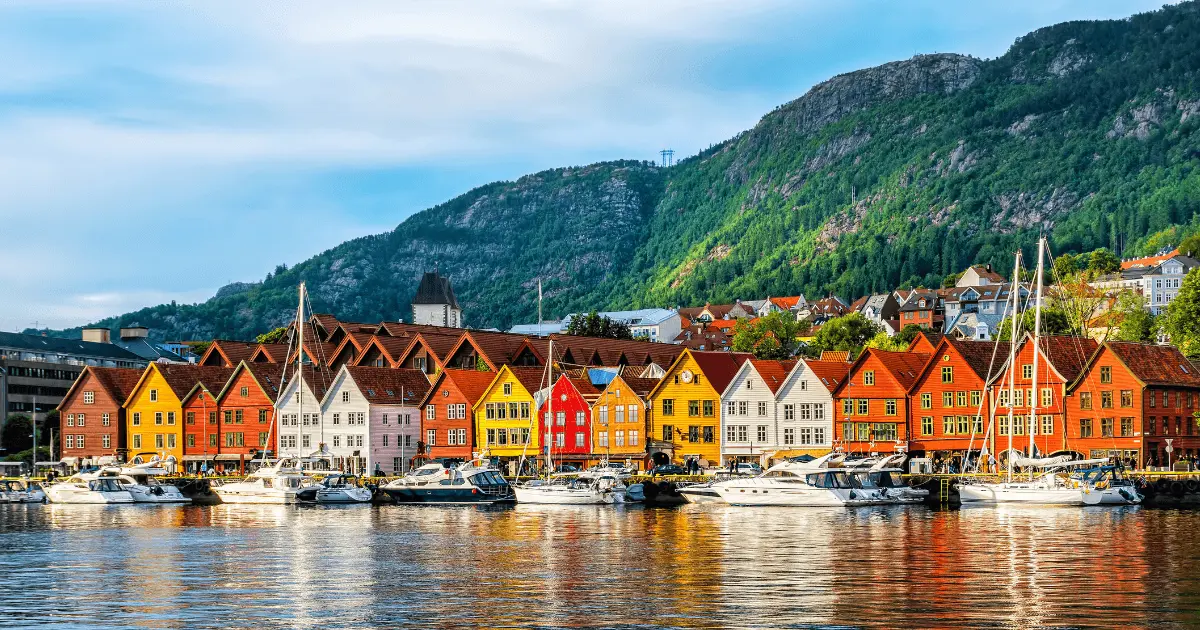
Norway, known for its stunning landscapes and wealth, offers a 2-year Independent Contractor Visa for digital nomads and remote workers.
This opportunity is suitable for those with deep pockets, as Norway has a high cost of living.
The visa fee is €600. It’s valid for 6 months to 3 years, and you must demonstrate an income of €35,719 along with proof of accommodation. Norway offers excellent internet speeds.
Capital: Oslo
Language: Norwegian and Sami
Visa Cost: €600
Income Requirements: €35,719 plus proof of accommodation
Visa Length: 2 years with possibility of extension
Visa name: Independent Contractor Visa
Cost of living index: 82.2 – (9 out of 140)
Internet: 106.64 Mbps
5. Cayman Islands
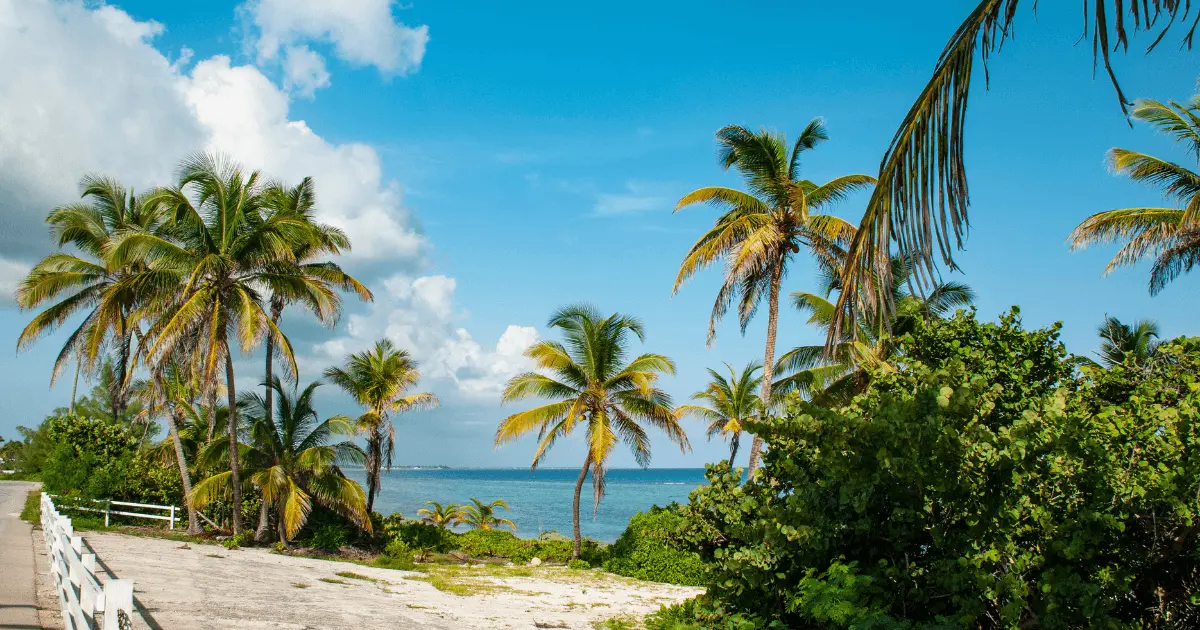
Get 50% Discount to Master ALL Aspects of Digital Marketing That Can Earn You $2,500 - $5,000 a month (Even if you are a complete beginner!)
Our students that intentionally implement what they learn from our digital marketing course make back the entire course fee within a single month or more after completing our course because our course gives them many income generating options with unlimited earning potential with no age or location barrier. The best part is no technical skills are required.
An opportunity to change your lifestyle and make money working from anywhere in the world. The results our students get from our digital marketing course prove this could be applied to any market or country and that it is designed for any skill level and work background.
*By signing up, you agree to our privacy policy and terms of service.
Cayman Islands
This country is a tropical paradise filled with beautiful long sandy beaches and a sunny climate. It is probably the perfect place for a holiday destination. It also offers other interesting things, like a high standard of living uncommon in the Caribbean islands. The Cayman Islands Department of Tourism has recently introduced a digital nomad visa known as the Global Citizen Concierge Program (GCCP), enabling nomads to reside and work in the country for a duration of up to 2 years. The minimum income requirement though is a bit more expensive as the program targets wealthier remote workers.
Capital: George Town, Grand Cayman
Language: English
Visa Cost: $1,469
Income Requirements: $100,000 per year for a single, $150,000 per year for a couple, $180,000 per year for a family
Visa Length: 2 years
Visa name: Global Citizen Concierge Program (GCCP)
Cost of living index:
Internet: 99.42 Mbps
6. Portugal
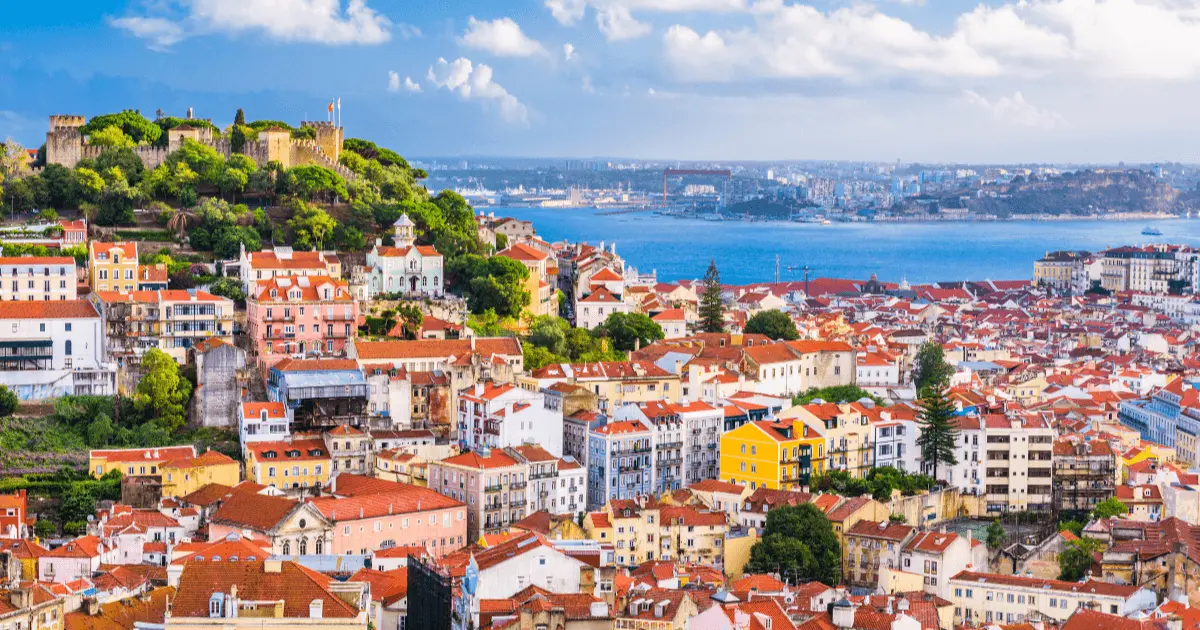
Portugal provides the D7 Visa, which is valid for 1 year and can be renewed for up to 5 years, potentially leading to permanent residency.
You can live and work in vibrant cities like Lisbon, Porto, or the serene beaches of the Algarve, Madeira, and the Azores. Portugal recently launched a digital nomad visa with less paperwork but no pathway to permanent residency.
Costs include €83 for the visa and €72 for the resident permit fee. To qualify, you need to demonstrate a monthly income of €600 from various sources.
Portugal offers good internet speeds and a moderate cost of living.
Visa Cost: €83 and €72 resident permit fee
Income Requirements: €3000 per month (4 times the minimum wage)
Visa Length: 1 year and renewable for up to 5 years
Cost of living index: 46.1 – (65 out of 140)
7. Canada

It is a highly sought-after destination for numerous international individuals seeking remote work opportunities. Regrettably, Canada does not have a specific digital nomad visa, but this does not imply that living and working as a digital nomad in this beautiful country is unattainable.
Quite recently, the Canadian federal government revealed announced they are seeking to attract international talent through a “digital nomad strategy.” While Canada does not have a Digital Nomad Visa, there are still viable options available for remote workers who wishes to visit the country.
Under current Canadian immigration rules, a digital nomad only needs the visitor visa to relocate to Canada for up to six months at a time while they perform their job remotely for a foreign employer. However, the most viable option for digital nomads is the ‘Self-employed Scheme’ which allows you work and live in Canada for 5 years.
Capital: Ottawa
Languages: English
Visa Cost: N/A
Income Requirements: N/A
Visa name: Self-Employed Scheme
Visa Length: 5 years
Cost of living index:
8. Malta

The tiny island nation of Malta offers the Nomad Residency Permit for NON-EU remote workers, valid for 1 year and renewable. Malta boasts a nationwide 5G network, English as an official language, and over 300 days of sunshine annually.
The visa costs €300, inclusive of family members.
To qualify, you need to prove a monthly income of €2,700 along with a rental contract or property purchase. Malta has a moderate cost of living and good internet speeds.
Visa Cost: €300
Income Requirements: €2,700 per month
Visa Length:
Visa name: Nomad Residence Permit
Cost of living index: 66.4
Internet: Average download speed 100 Mbps
Work Restrictions: None
9. Anguilla
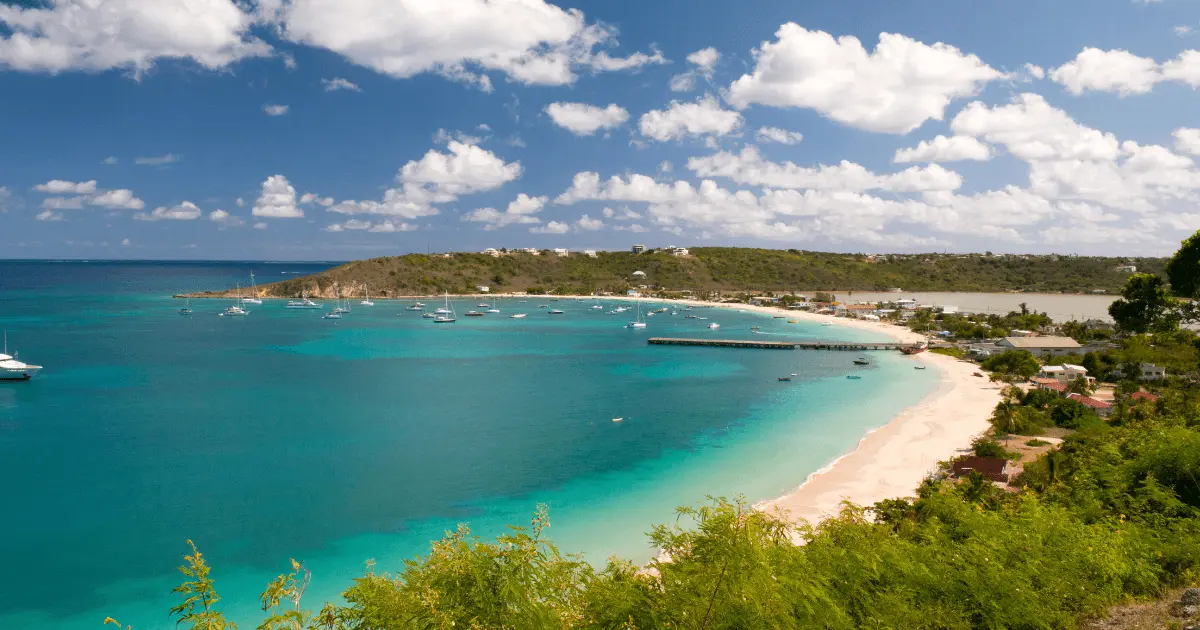
Anguilla offers a Digital Nomad visa that includes PCR testing and surveillance during your stay. This Caribbean island has a small population of 15,000 and is relatively compact, measuring 26 kilometers in length and 5 kilometers at its widest point.
While it may be considered remote by some due to its size and limited connectivity, others may find its isolation appealing.
The cost of this program is $2,000, and it provides a 1-year stay with some specific income requirements that are not easily available until you start your processing. Internet speeds on the island are moderate.
Capital: The Valley
Language: English
Visa Cost: $2,000
Income Requirements: N/A
Visa Length: 1 year
Visa name: Digital Nomad Visa
Cost of living index: N/A
Internet: Average download speed of 13 Mbps
10. Montserrat

Montserrat, slightly larger than Anguilla at 102 square kilometers, has an even smaller population of 5,900. This island, located north of Guadeloupe, offers the Montserrat Remote Work Stamp program.
While current internet speeds are relatively low, there are plans for a fiber optic network.
Program costs vary: $500 for a single person, $750 for a family of up to 3 dependents, and $250 for each additional family member. To qualify as an individual, you need to prove an annual income of $70,000.
Capital: Plymouth and Brades
Language: English
Visa Cost: $500 single person, $750 family of up to 3 dependents, and $250 for each additional family member.
Income Requirements: $70,000 per year
Visa Length: 1 year
Visa name: Montserrat Remote Work Stamp
Cost of living index: N/A
Internet: 56.68 Mbps
11. Dominica
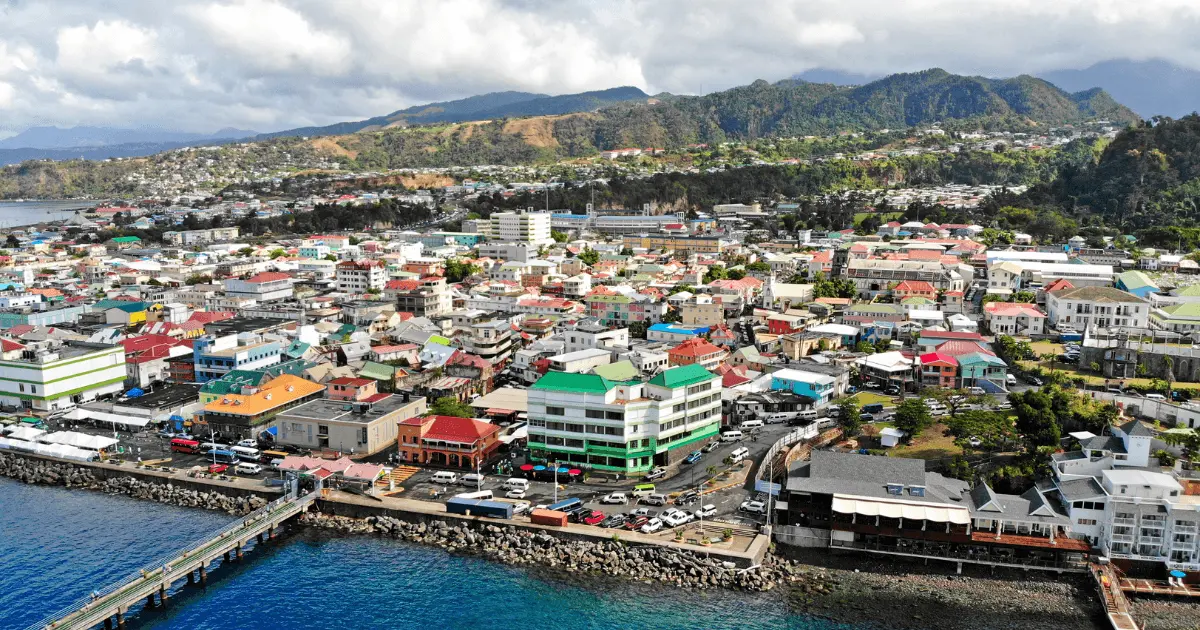
The Commonwealth of Dominica, situated between Guadeloupe and Martinique in the Caribbean, has introduced the WIN Work In Nature Digital Nomad visa program.
This program allows individuals to stay on the tropical volcanic island for up to 18 months, providing an income tax break and access to education for families.
Costs for the program include a $100 non-refundable application fee, $800 for a single person, and $1,200 for a family. To qualify, you need to demonstrate an annual income of $70,000.
For better understanding, the cost of living index for Dominica is estimated to be similar to Canada and the internet speeds are moderate.
Capital: Roseau
Language: English
Visa Cost: $100 application fee (non-refundable), $800 single person, $1200 for a family.
Income Requirements: $70,000 per year
Visa Length: 18 months
Visa name: Work in Nature (WIN) long-stay Visa
Cost of living index: 25 out of 140
Internet: 79.7 Mbps
12. The Bahamas
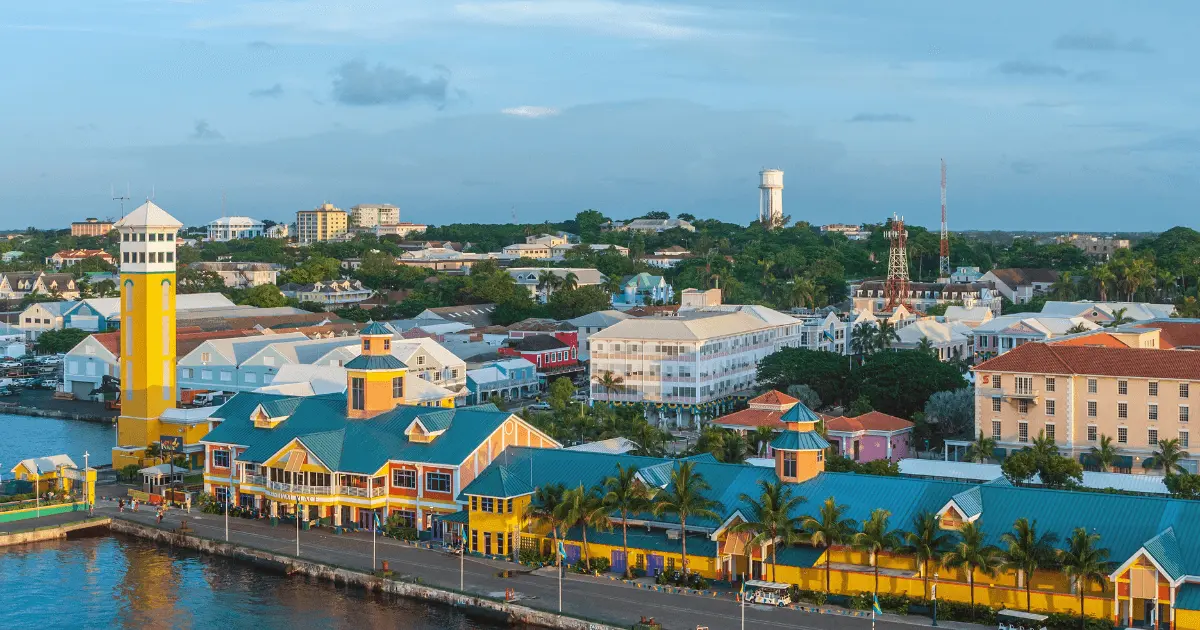
The Bahamas, with its 16 tax-free islands, has introduced the Bahamas Extended Access Travel Stay (BEATS) program.
This program offers a 12-month stay, extendable to 36 months on a case-by-case basis.
The cost of the program includes a $25 application fee, $1,000 for the first applicant, and $500 for each dependent. Qualification requires a letter from a current employer or proof of self-employment and income.
The cost of living index for The Bahamas is relatively high and the internet speeds are moderate.
Capital: Nassau
Language: English
Visa Cost: $25 application fee. $1000 for the first applicant and $500 for each dependent
Income Requirements: a letter from your current employer or proof of self-employment and income
Visa Length: 1 year and can be renewed on a case-by-case basis to 3 years
Visa name: Bahamas Extended Access Travel Stay
Cost of living index: 93.7 – (4 out of 140)
Internet: Average download speed of 43.58 Mbps
13. Curaçao

Curaçao, located outside the hurricane zone in the Caribbean, offers the @HOME in Curaçao program.
This program allows for an initial 6-month stay with the possibility of a 6-month extension.
The program costs $294 per person. Applicants need to provide proof of solvency but specific income requirements are not mentioned.
Curaçao’s cost of living index is estimated to be similar to Italy and internet speeds are moderate.
Capital: Willemstad
Language: Dutch, English, Papiamentu
Visa Cost: $294
Income Requirements: proof of sufficiency
Visa Length: 6 months with another 6 months extension
Visa name: HOME in Curaçao
Cost of living index: 35 out of 140
14. Croatia

Croatia has introduced its Digital Nomad Visa, offering an affordable way to live and work remotely in Europe.
While it’s technically a temporary residency permit, it serves the needs of digital nomads effectively. Eligible applicants can apply within Croatia or at Croatian consulates and embassies.
The program allows a maximum stay of one year, extendable after six months. To qualify, you need to prove a monthly income of €2,232 or €26,790 for a year-long stay. In addition, Croatia offers a diverse environment with captivating cities, a beautiful coastline, and numerous islands.
Capital: Zagreb
Language: Croatian
Visa Cost: $73 for the visa and $66 for the temporary residence.
Income Requirements: $2,658 per month
Visa Length: 6 months to 1 year
Visa name: Digital Nomad Residence Permit
Cost of living index: 47.4 – (64 out of 140)
Internet: 47.18 Mbps
15. Czechia (Czech Republic)
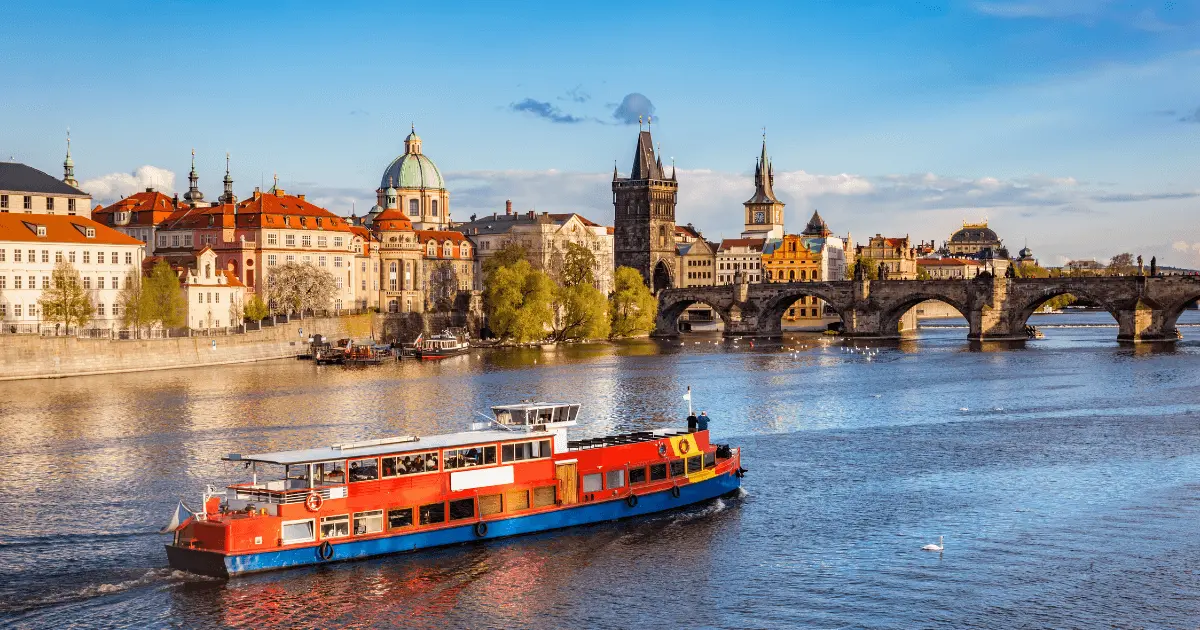
Czechia, particularly Prague, is a favored destination among digital nomads. The Zivno freelancer visa allows remote work for one year and is extendable.
However, it’s limited to specific trade licenses, making it challenging to obtain for some professions. While the program itself is free, you need to show a proof of €5,587 in your bank account, per person. Additionally, you must pay €70 in monthly taxes. Czechia offers a moderate cost of living and excellent internet speeds.
Capital: Prague
Languages: Czech
Visa Cost: $115
Income Requirements: $5,200 in the bank per person
Visa Length: 1 year with the possibility of extension
Visa name: Zivno
Cost of living index: 52.8 – (51 out of 140)
Internet: Average download speed of 29 Mbps
16. Estonia
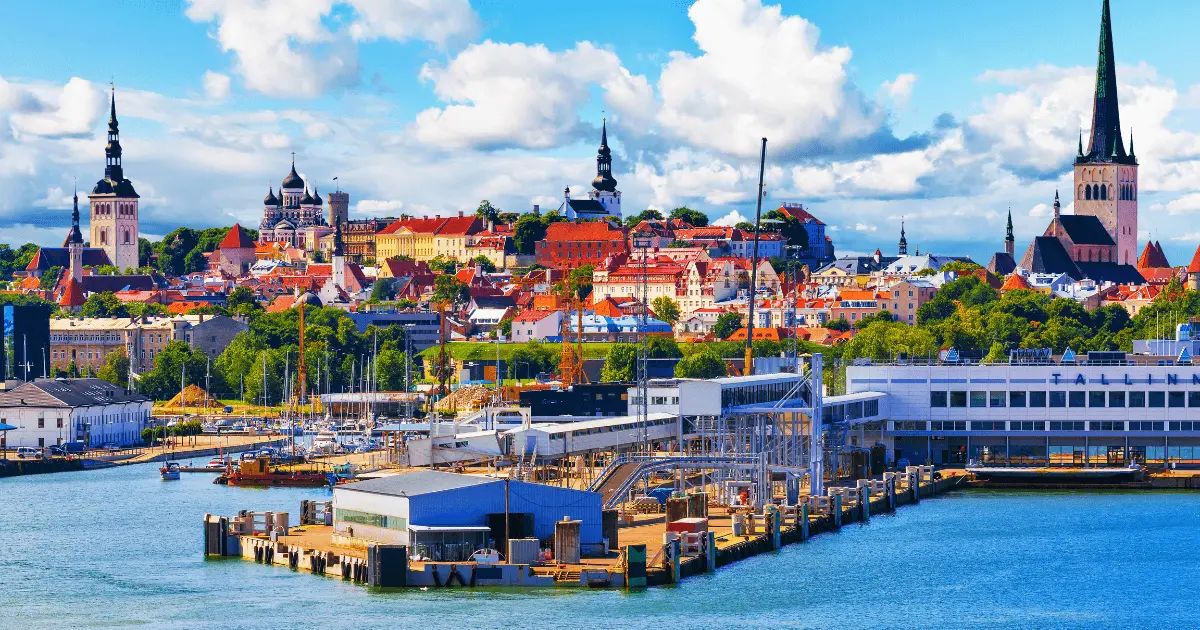
Estonia, a pioneer in e-residency programs, launched a one-year digital nomad and freelancer visa in 2020. The program facilitates remote work within the country.
Costs for the visa include €80 for a short stay and €100 for a long stay. It is also demanded that you must demonstrate an annual income of €3,504 to qualify. Estonia boasts a high-speed internet infrastructure and a moderate cost of living.
Capital: Tallinn
Language: Estonian
Visa Cost: €80 short stay, €100 long stay
Income Requirements: €3,504 per month
Visa Length: 1 year
Visa name: Estonia Digital Nomad Visa
Cost of living index: 62.42 / 100.
Internet: Average download speed 100 Mbps
17. Saint Lucia
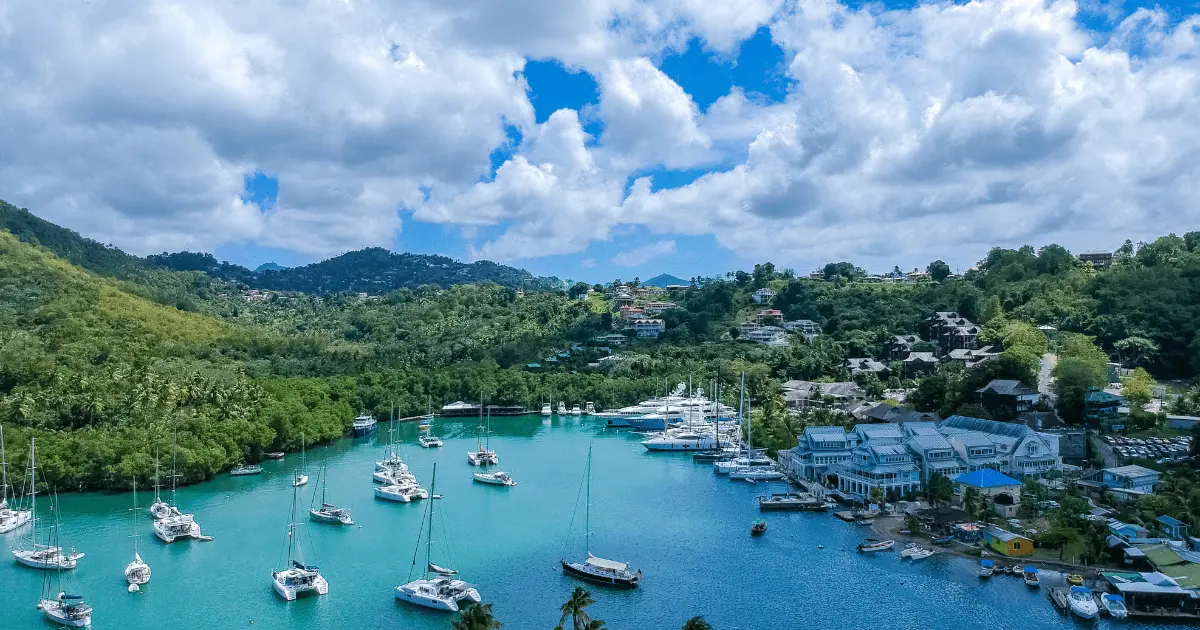
Saint Lucia has adapted its Non-Immigrant Visa to offer the Saint Lucia Live It program, allowing a 12-month multiple entry visa for remote work.
This program has a low cost of $190 ($75) per person and no minimum income requirements.
Saint Lucia’s cost of living index is estimated to be similar to Italy and internet speeds are moderate.
Capital: Castries
Language: English
Visa Cost: $75
Income Requirements: None
Visa Length: 1 year multiple entry visa
Visa name: The Live It program
Cost of living index:
Internet: 80.5 Mbps
18. Grenada
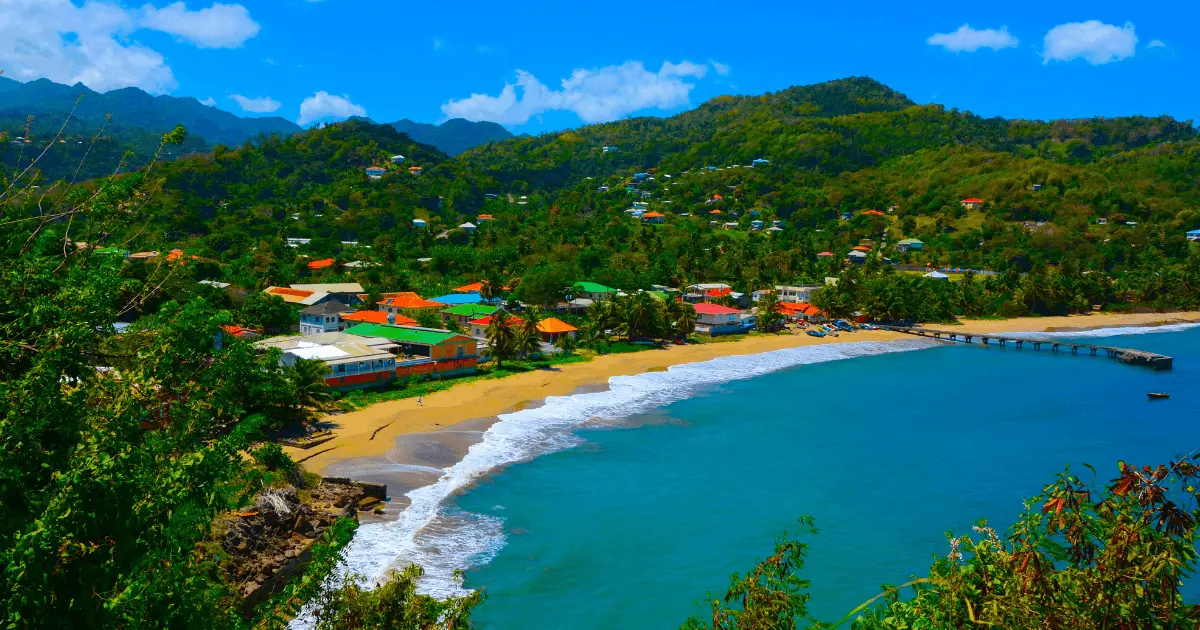
The Caribbean island of Grenada, known as the spice island, offers a digital nomad visa valid for one year, renewable for another year. One of the advantages is the zero-income tax policy.
The program costs $1,500 per person, $2,000 for a family with 3 dependents, and $200 for each additional dependent. To qualify as an applicant, you need to show proof of an annual income of $37,000. Internet speeds in Grenada are moderate.
Capital: St. George’s
Language: English, Grenadian Creole, French
Visa Cost: $1,500 per person, $2000 for a family with 3 dependents, $200 for each additional dependent.
Income Requirements: $37,000 per year
Visa Length: 1 year, renewable for an additional 1 year
Visa name: Grenada Digital Nomad Visa
Cost of living index: N/A
Internet: 73.74 Mbps
19. Costa Rica
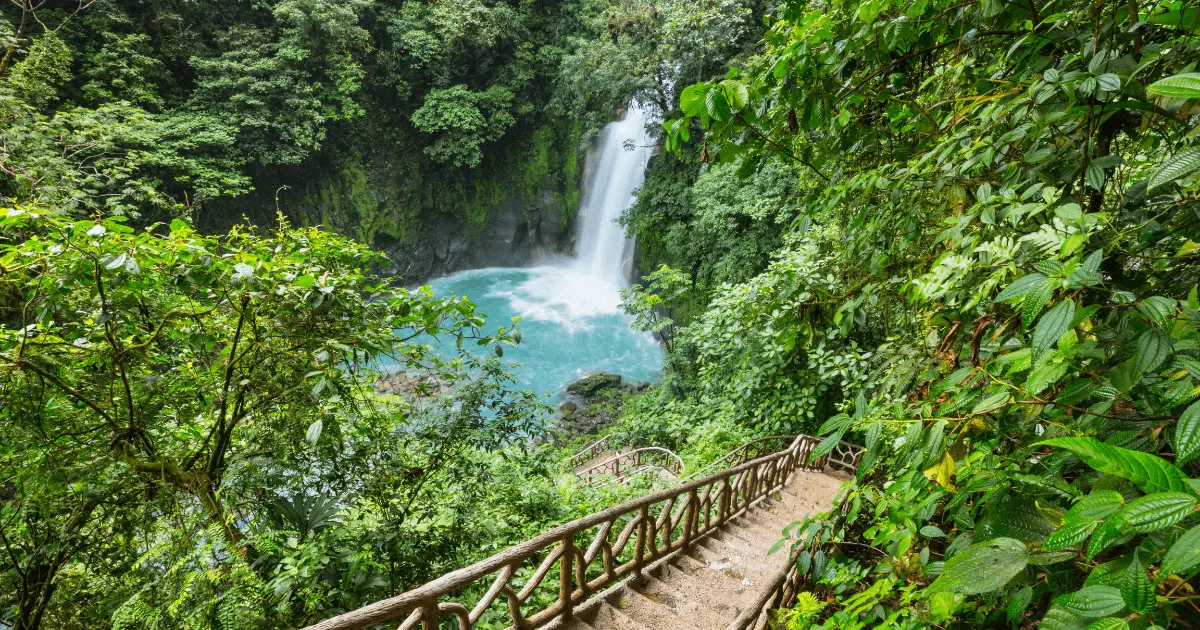
Costa Rica, famous for its natural beauty and relaxed lifestyle, offers two visa options for digital nomads. The Rentista visa allows a 2-year stay and is intended for self-employed individuals or entrepreneurs.
A new digital nomad visa, with a maximum duration of 2 years, is in development. Costs for the Rentista visa are $250, with income requirements of $2,500 per month over the last 2 years or a $60,000 deposit in a Costa Rican bank.
Specific costs and income requirements for the digital nomad visa were not available. However, Costa Rica has a moderate cost of living and good internet speeds.
Capital: San Jose
Language: Spanish
Visa Cost: $190
Income Requirements: at least $3,000 per month. $4,000 if applying with a family.
Visa Length: One year, can be extended for one more year.
Visa name: Digital Nomad Visa
Cost of living index: 53 – (50 out of 140)
Internet: 66.59 Mbps
20. Mexico
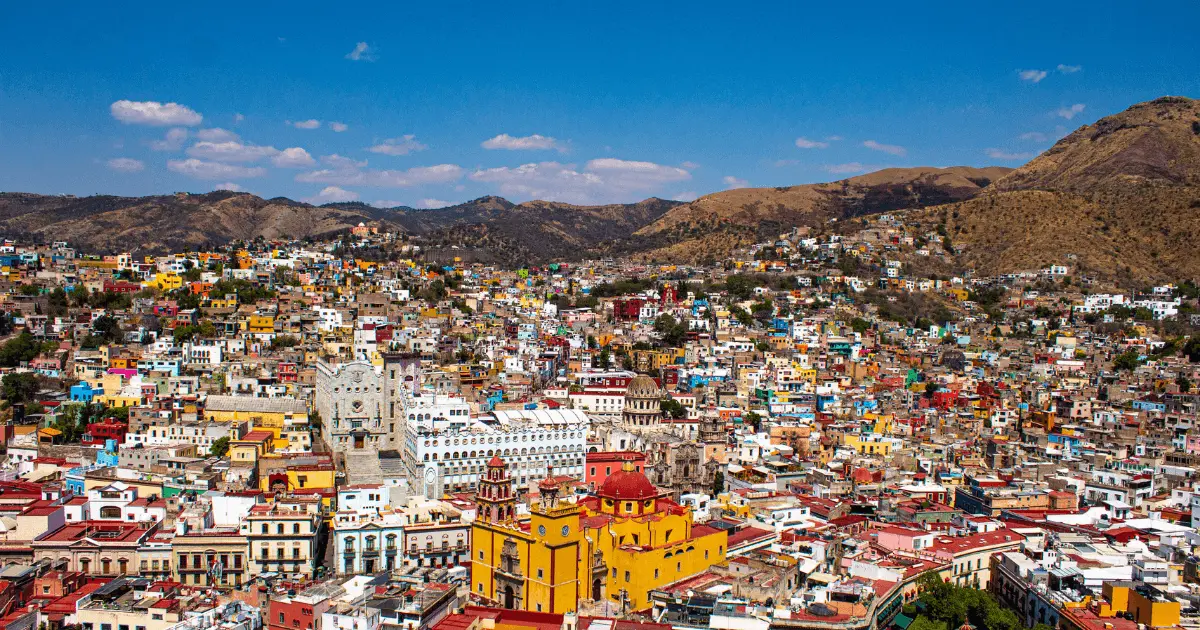
Mexico, known for its diverse landscapes, rich culture, and low cost of living, offers options for digital nomads. Tourists can stay for up to 6 months with a tourist visa, while the Temporary Resident Visa allows a maximum stay of 4 years.
Costs for these visas range from $190 to $390, including the interview. Income requirements are $1,620 per month or a bank balance of $27,000.
Mexico ranks moderately on the cost of living index, and its internet speeds are decent.
Visa Cost:
Income Requirements: €3,504 per month
Visa Length:
Visa name: Temporary Stay for the Purpose of Remote Work Visa
Cost of living index: 53.69 / 100.
Internet: Average download speed 100 Mbps
21. Panama

Panama, the most developed country in Central America, offers a 9-month Short Stay Visa for Remote Workers, extendable to 18 months. The program costs $300, with income requirements of $36,000 per year.
Panama boasts a high standard of living, warm climate, and good internet speeds. However, it is also known for its higher cost of living.
Capital: Panama City
Language: Spanish
Visa Cost: $300
Income Requirements: $36,000 per year
Visa Length: 9 months, renewable for another 9 months
Visa name: Short-term visa
Cost of living index: 48.2 – (59 out of 140)
Internet: 114.39 Mbps
22. Greece

Greece is a versatile destination, offering culture, food, beautiful beaches, and numerous islands. It’s also known for its decent internet speeds and comparatively low cost of living within Europe.
Greece provides two programs to attract digital nomads:
First, a 50% income tax reduction for 7 years to specific nationalities committing to staying for at least 2 years.
Second, the Greece digital nomad visa for non-EU/EEA citizens allows remote work in Greece for foreign employers or foreign-registered companies. The initial visa period is 1 year but can be extended twice, totaling 3 years.
Requirements include a visa cost of €75 and proving a monthly income of €3,500, with additional percentages for spouses/partners and children. Greece offers a moderate cost of living and decent internet speeds.
Capital: Athens
Language: Greek
Visa Cost: $79
Income Requirements: $3,690 per month.
Visa Length: 1 year with the possibility to extend up to 3 years
Visa name: Greece Digital Nomad Visa
Cost of living index: 53.2 – (47 out of 140)
Internet: 44.6 Mbps
23. Romania

Romania, known for having the EU’s fastest fixed broadband internet speeds, introduced its digital nomad visa in December 2021.
This visa is initially valid for 12 months and can be renewed for another year.
Requirements include proving a monthly income of €3,300.
Romania’s cost of living is relatively low, although it recently increased income requirements.
Internet speeds in Romania are quite high.
Capital: Bucharest
Language: Romanian
Visa Cost: Unknown
Income Requirements: $3,900 per month
Visa Length: 1 year, renewable for another 1 year
Visa name: Digital Nomad Visa
Cost of living index: 38.4 – (89 out of 140)
Internet: 175.08 Mbps
24. Hungary

Hungary launched its Digital Nomad Visa, called the White Card, in November 2021.
This visa has a reasonable income requirement of €2,000 per month and is for individual residency, targeting singles under 40.
It allows remote work in picturesque Budapest, known for having some of Europe’s fastest internet speeds. The visa costs €110 per applicant. Hungary offers a moderate cost of living.
Capital: Budapest
Language: Hungarian
Visa Cost: $116
Income Requirements: $2,110 per month
Visa Length: 1 year with the possibility of extension
Visa name: White Card
Cost of living index: 48 – (60 out of 140)
Internet: 138.8 Mbps
25. Cyprus
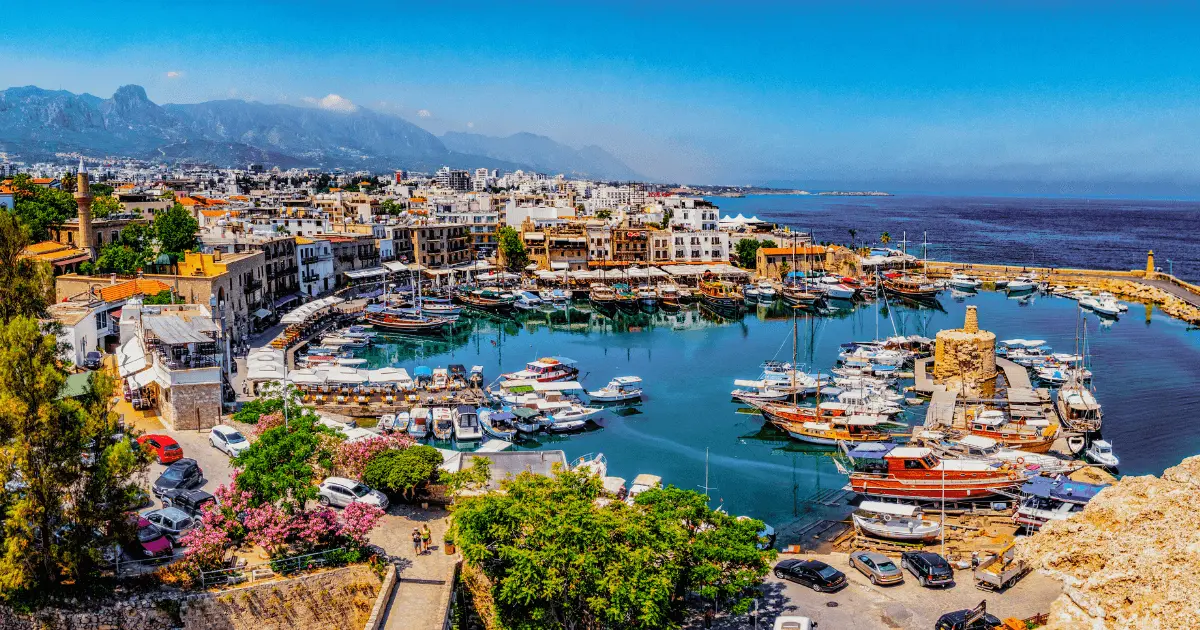
Cyprus introduced a digital nomad visa for UK citizens and other non-EU citizens, allowing them to work remotely on the island for 12 months, extendable for an additional 24 months.
Applicants need a police clearance certificate and private medical insurance. Originally limited to 100 permits, this program has now been expanded to 500 temporary residency permits. Costs include a €70 issuance fee, renewal fee, and €70 registration fee for the Aliens’ Registry. Income requirements include €3,500 per month after taxes. Cyprus offers a moderate cost of living and decent internet speeds.
Capital: Nicosia
Languages: Greek and Turkish
Visa Cost: €70 issuance fee and renewal fee. €70 registration to Aliens’ Registry
Income Requirements: €3,500 per month after taxes
Visa Length: One year, renewable for 2 more years.
Visa name: Digital Nomad Visa scheme
Cost of living index: 59.2 – (37 out of 140)
Internet: 51.5 Mbps
26. Latvia

Latvia has followed Estonia by introducing the Latvia Digital Nomad Visa, valid for one year and renewable for another year. This visa is available to foreign nationals working for employers or businesses registered in OECD (Organisation for Economic Co-operation and Development) countries. Costs for the visa are €60 or €120 for expedited processing. Income requirements involve proving that your earnings are 2.5 times the average annual wage in Latvia. Latvia offers a moderate cost of living and decent internet speeds.
Capital: Riga
Language: Latvian
Visa Cost: $65
Income Requirements: $3,020 per month
Visa Length: 1 year, renewable for another 1 year
Visa name: Latvia Digital Nomad Visa
Cost of living index: 51 – (53 out of 140)
Internet: 76.01 Mbps
27. Albania

Albania streamlined its residency permit process, making it easier for digital nomads and pensioners. The Albania Digital Nomad Visa offers a one-year stay, renewable for an additional year and up to five years. After seven years, permanent residency can be applied for. No information on Albania’s current income requirements. But the country boasts a moderate cost of living and reasonable internet speeds.
Capital: Tirana
Language: Albanian
Visa Cost: Calculated based on the equivalent fee an Albanian citizen would pay when applying for a visa to your home country.
Income Requirements: $9,800 per year
Visa Length: 1 year, renewable for 1 more year, up to 5 times.
Visa name: Type D Long Stay Visa
Cost of living index: 40.4 – (84 out of 140)
Internet: Average download speed of 45.64 Mbps
28. Armenia

Armenia provides a residency permit allowing foreign business owners to stay for one year, renewable for up to five years. The only requirement is to register as a sole entrepreneur.
The visa costs $270 per individual. Armenia offers a moderate cost of living and fair internet speeds.
Capital: Yerevan
Language: Armenian
Visa Cost: $270
Income Requirements: Sufficient Income
Visa Length: 1 year, renewable for up to 5 years
Visa name: Armenian Residence Permit
Cost of living index: 43.1 – (72 out of 140)
Internet: Average download speed of 38.67 Mbps
29. Barbados
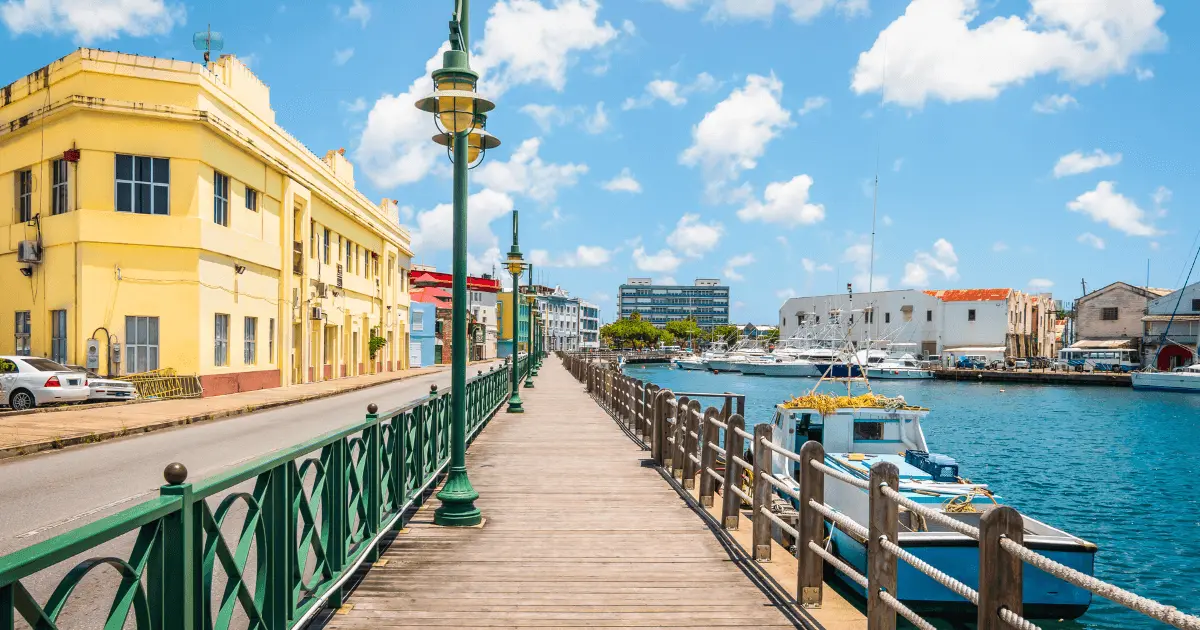
Barbados launched the Barbados Welcome Stamp program, allowing individuals to work remotely on the island for one year.
Applicants need to demonstrate an annual income of $50,000. While the cost of the program is $2,000 for an individual or $3,000 for a couple or family. Barbados has a relatively high cost of living but offers good internet speeds.
Capital: Bridgetown
Language: English
Visa Cost: $2,000 for individuals, $3,000 for families
Income Requirements: $50,000 per year
Visa Length: 1 year
Visa name: Barbados Welcome Stamp
Cost of living index: 84.2 – (7 out of 140)
Internet: Average download speed 40 Mbps
30. Antigua & Barbuda
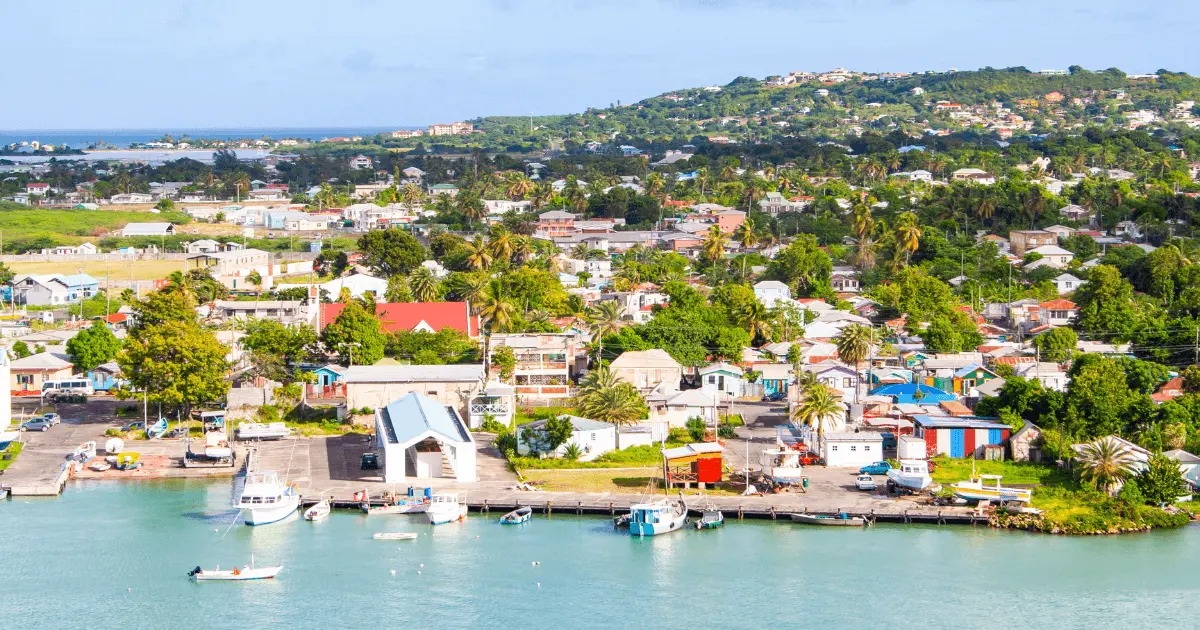
Antigua & Barbuda offers the Antigua Nomad Digital Residence, a two-year digital nomad visa.
The income requirement is $50,000 per year. Costs vary: $1,500 for an individual, $2,000 for a couple, and $3,000 for a family of three or more. The country also provides reasonable internet speeds.
Capital: Saint John’s
Language: English
Visa Cost: $1,500 individual, $2,000 a couple $3,000 for a family of 3 or more.
Income Requirements: $50,000 per year
Visa Length: 2 years
Visa name: Nomad Digital Residence (NDR)
Cost of living index: N/A
Internet: Average download speed of 29.75 Mbps
31. Bermuda
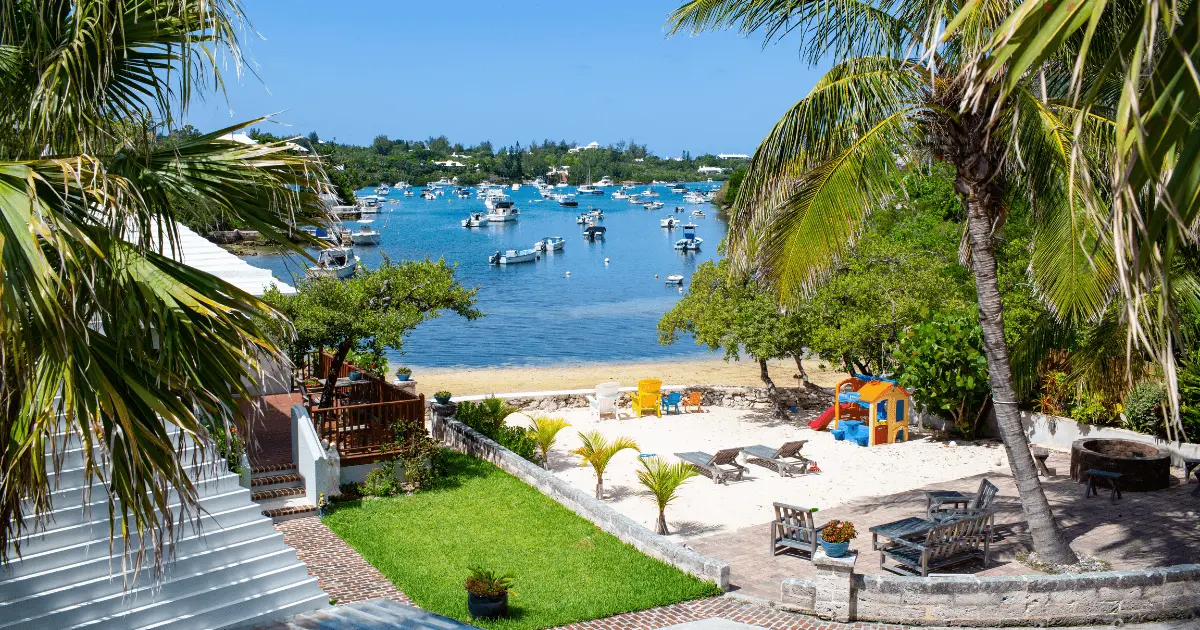
Bermuda’s Work From Bermuda visa is cost-effective to apply for, with no specific income requirement.
However, Bermuda is one of the world’s most expensive countries to live in and the visa costs $263. It offers high-quality internet but has a very high cost of living.
Capital: Hamilton
Language: English
Visa Cost: $263
Income Requirements: None (enough to support yourself
Visa Length: 1 year
Visa name: Work From Bermuda Certificate
Cost of living index: 145.8
Internet: Average download speed 50 Mbps
32. Belize

Belize introduces its “Work Where You Vacation” program, a Belize Digital Nomad Visa offering a 180-day stay for remote work.
To be eligible, individuals must provide proof of earning a minimum of $75,000 annually and carry health insurance coverage of $50,000.
Belize, an English-speaking country, boasts beautiful beaches and historical Mayan sites. The visa costs $250 and can be extended as needed. Belize has a moderate cost of living index and decent internet speeds.
Capital: Belmopan
Language: English
Visa Cost: $250
Income Requirements: Minimum annual income of $75,000 for individuals or $100,000 for couples/families.
Visa Length: 6 months with the possibility of extension
Visa name: Work Where You Vacation program
Cost of living index: 50 – (55 out of 140)
Internet: Average download speed 39.75 Mbps
33. El Salvador
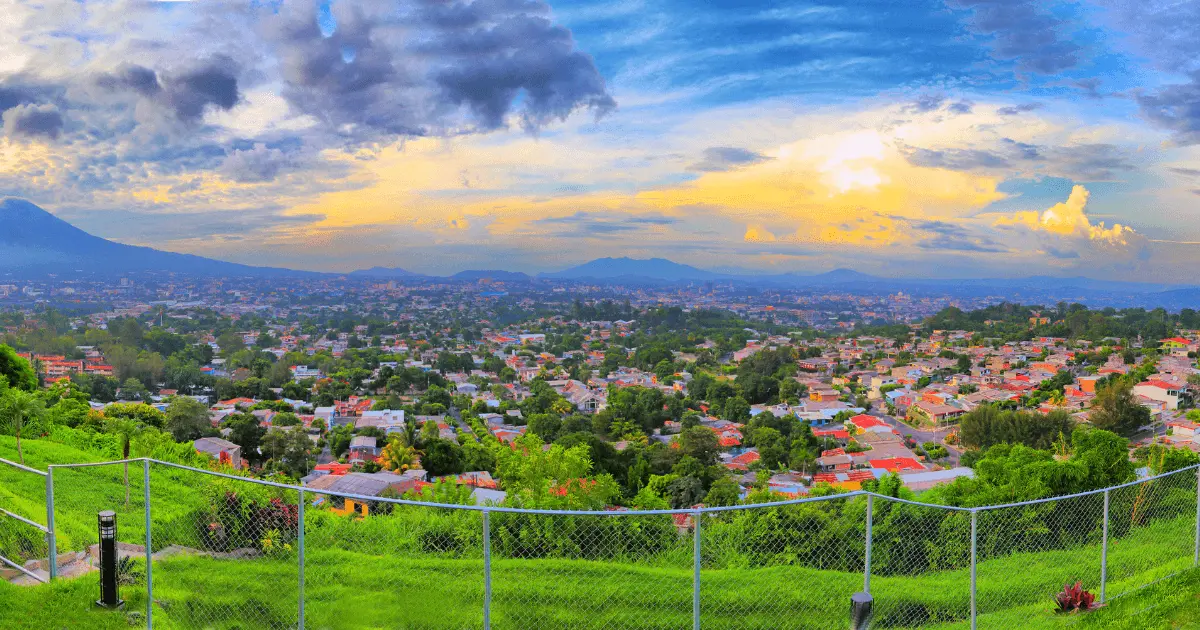
El Salvador, known for adopting Bitcoin as legal tender, has quietly launched its digital nomad visa program. The program costs $2,825 with a renewal fee of $450.
It offers a 2-year initial stay with the option to extend for an additional 2 years. Income requirements include a monthly income of $1,460. El Salvador ranks moderately in the cost of living index, with reasonable internet speeds.
Capital: San Salvador
Language: Spanish
Visa Cost: $2,825 / Renewal $450
Income Requirements: $1,460 monthly
Visa Length: 2 years, renewable for an additional 2 years
Visa name: The El Salvador Digital Nomad Visa
Cost of living index: 42.3 – (76 out of 140)
Internet: 35.29 Mbps
34. Brazil

Brazil becomes the first South American country to offer a digital nomad visa, announced on January 24, 2022. The visa is valid for one year, with an option to renew for an additional year.
Income requirements are set at a minimum of $1,500 per month and the application process takes place at a Brazilian embassy. Specific visa costs are not mentioned. Brazil offers a moderate cost of living index and good internet speeds.
Capital: Brasilia
Language: Portuguese
Visa Cost: N/A
Income Requirements: $1,500 per month
Visa Length: 1 year renewable for an additional 1 year
Visa name: Digital Nomad visa
Cost of living index: 37.7 – (90 out of 140)
Internet: 102.24 Mbps
35. Ecuador

Ecuador launched its digital nomad visa in July 2022, attracting nomads with its diverse landscapes, including the Amazon jungle, ocean, Andes mountains, and colonial cities.
The visa provides a 2-year stay with income requirements of $1,275 per month. Visa cost is not included. Ecuador has a low cost of living and decent internet speeds.
Capital: Quito
Language: Spanish and Quichua
Visa Cost: $50 application fee and $400 visa fee
Income Requirements: $1,275 per month
Visa Length: 2 years
Visa name: The Rentista for Remote Work
Cost of living index: 34.2 – (102 out of 140)
Internet: 51.09 Mbps
36. Colombia
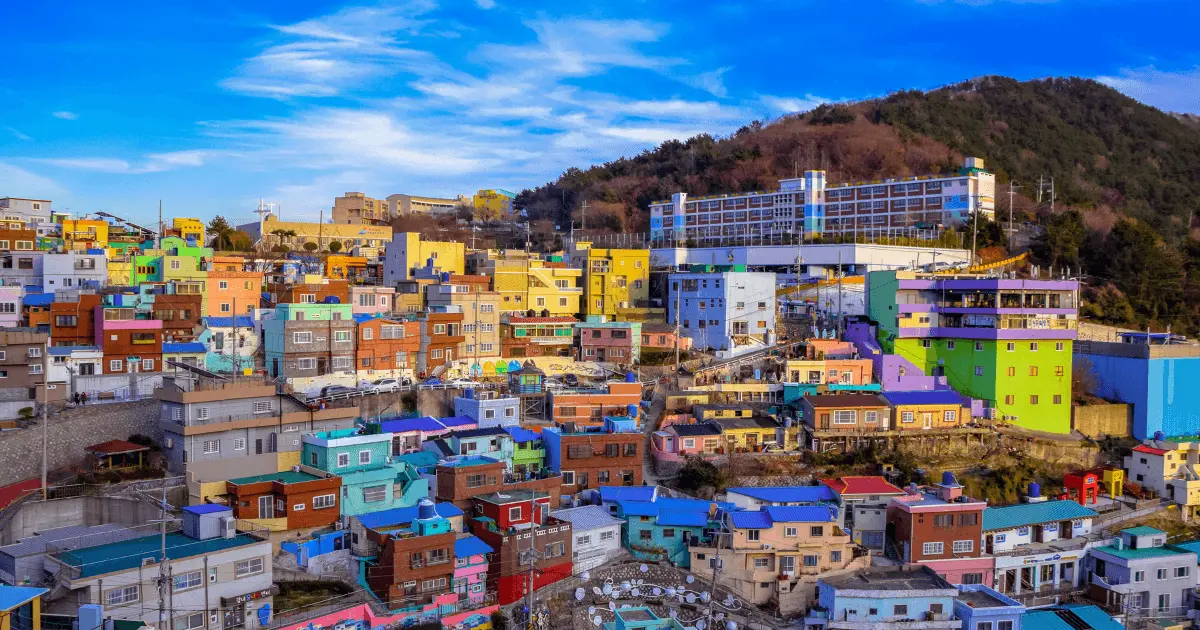
Colombia introduced the Digital Nomad Visa, locally known as Visa V Nómadas Digitales, in April 2023. This 2-year visa, which cannot be extended, has one of the lowest income requirements at $684 per month.
It allows for the inclusion of spouses and children and the visa application fee is $177. Colombia ranks low in the cost of living index, with good internet speeds.
Capital: Bogota
Languages: English & Spanish
Visa Cost: $177
Income Requirements: $684 per month
Visa Length: 2 years (no extension)
Visa name: Visa V Nomadas Digitales
Cost of living index: 27.6 – (129 out of 140)
Internet: 92.96 Mbps
37. Italy
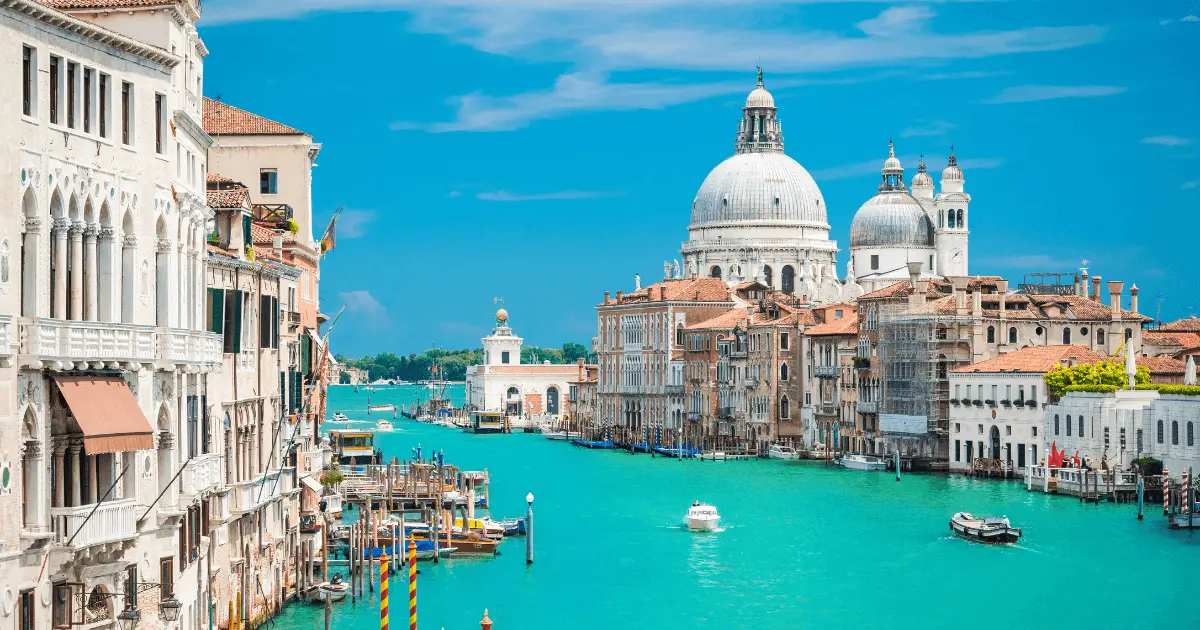
In March 2022, Italy’s digital nomad visa was formally approved into law. Currently, there isn’t much information yet on the details of this digital nomad visa. However, it is primarily intended for non-European Union digital nomads or highly skilled remote workers who operate independently or for a company based outside the territorial boundaries of Italy.
Capital: Rome
Language: Italian
Visa Cost:
Income Requirements:
Visa Length: 1 year which is renewable
Visa name: Digital Nomad Visa
Cost of living index: 61 – (32 out of 140)
Internet: 63.54 Mbps
38. Dubai (UAE)

Dubai, a thriving megacity along the coast, launches a one-year virtual working program for remote workers and digital nomads.
The program comes with a visa cost of $287 and requires proof of €5,000 per month income over the last 3 months, along with evidence of employment or company ownership. This program allows individuals to benefit from Dubai’s zero income tax.
Applicants can apply from abroad or in Dubai, but entry may require a Dubai visa. Dubai ranks moderately in the cost of living index, with excellent internet speeds.
Capital: Abu Dhabi City
Language: Arabic
Visa Cost: $287
Income Requirements: $3,500 per month
Visa Length: 1 year
Visa name: Remote Work Visa
Cost of living index: 60.7 – (34 out of 140)
Internet: Average download speed of 219.47 Mbps
39. Abu Dhabi
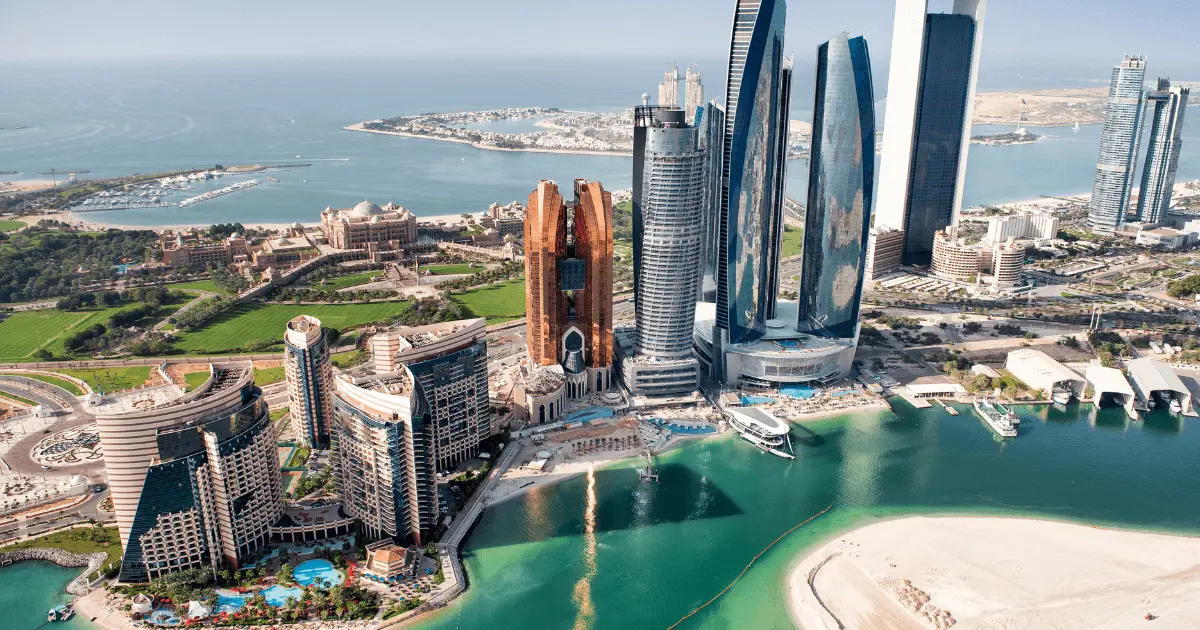
The Abu Dhabi Digital Nomad visa, somewhat overlooked compared to Dubai, offers similar costs at $287.
However, the minimum income requirement is significantly lower at $3,500 per month based on the last 3 months.
Like Dubai, this program grants the advantage of zero income tax in Abu Dhabi. It also shares a similar cost of living index and excellent internet speeds with Dubai.
Capital: Abu Dhabi City
Language: Arabic
Visa Cost: $287
Income Requirements: $3,500 per month
Visa Length: 1 year
Visa name: Remote Work Visa
Cost of living index: 60.7 – (34 out of 140)
Internet: Average download speed of 219.47 Mbps
40. Netherlands

The Netherlands, often referred to as Holland, stands out as one of the most technologically advanced nations in Europe. It is also one of the highest standards of living country in the world. It serves as a vibrant tech hub and a diverse cultural melting pot.
Holland is renowned for its exceptional quality of life, with the Dutch consistently ranked among the happiest people in both Europe and the world.
Although there isn’t a specific digital nomad visa for the Netherlands, an alternative option that serves the same purpose is the Long-Stay Visa. This visa is called Netherlands long-stay or MVV Visa.
Capital: Amsterdam
Language: Dutch
Visa Cost:
Income Requirements: $1,340 per month
Visa Length: 3 months
Visa name: MVV Visa
41. Thailand
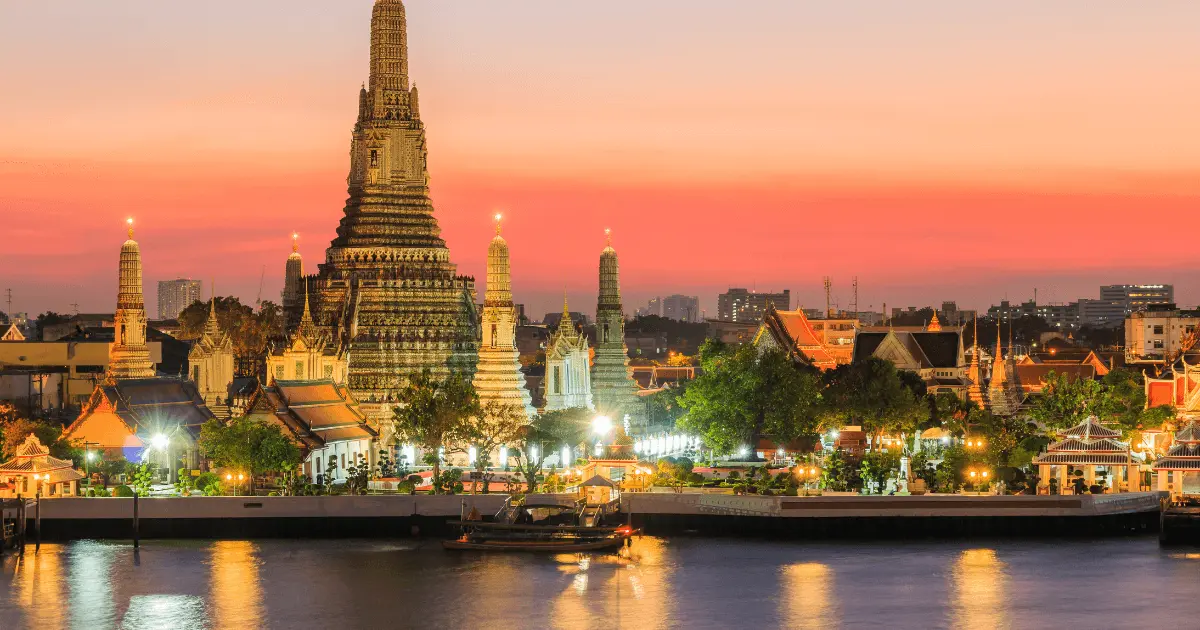
Thailand, a well-loved destination for digital nomads due to its affordability and fast internet, has finally introduced the Long Term Residency (LTR) Visa on September 1, 2022.
This visa, which spans 10 years, targets wealthy expats, investors, retirees, and digital nomads.
However, its strict requirements, including an $80,000 annual income and affiliation with public or high-revenue private companies places a limit to its accessibility for most digital nomads.
Visa costs $600 per individual, and the cost of living in Thailand is moderate with excellent internet speeds.
Capital: Bangkok
Language: Thai
Visa Cost: $600
Income Requirements: $80,000 per year. For individuals with income between $40,000 and $80,000, you need to show a master’s degree, own intellectual property or receive series A funding.
Visa Length: 10 years
Visa name: Long Term Residence Visa
Cost of living index: 38.5 – (87 out of 140)
Internet: 203.28 Mbps
42. Malaysia

Malaysia, Thailand’s neighboring country to the south, has launched the De Rantau Nomad Pass on October 1, 2022, aiming to attract digital nomads.
This digital nomad visa is valid for 12 months, extendable for another year, and is part of a program to establish digital nomad communities with dedicated services.
The income requirement is low at $2,000 per month, and visa costs are $220 with an additional $110 for those who plan to bring in spouses or dependents. Malaysia has a moderate cost of living index and good internet speeds.
Capital: Kuala Lumpur
Languages: Malay
Visa Cost: $220 + $110 for spouse or dependent
Income Requirements: $24,000 per year
Visa Length: 1 year, renewable for an additional 1 year
Visa name: De Rantau Nomad Pass
Cost of living index: 32.3 – (109 out of 140)
Internet: 93.01 Mbps
43. Mauritius
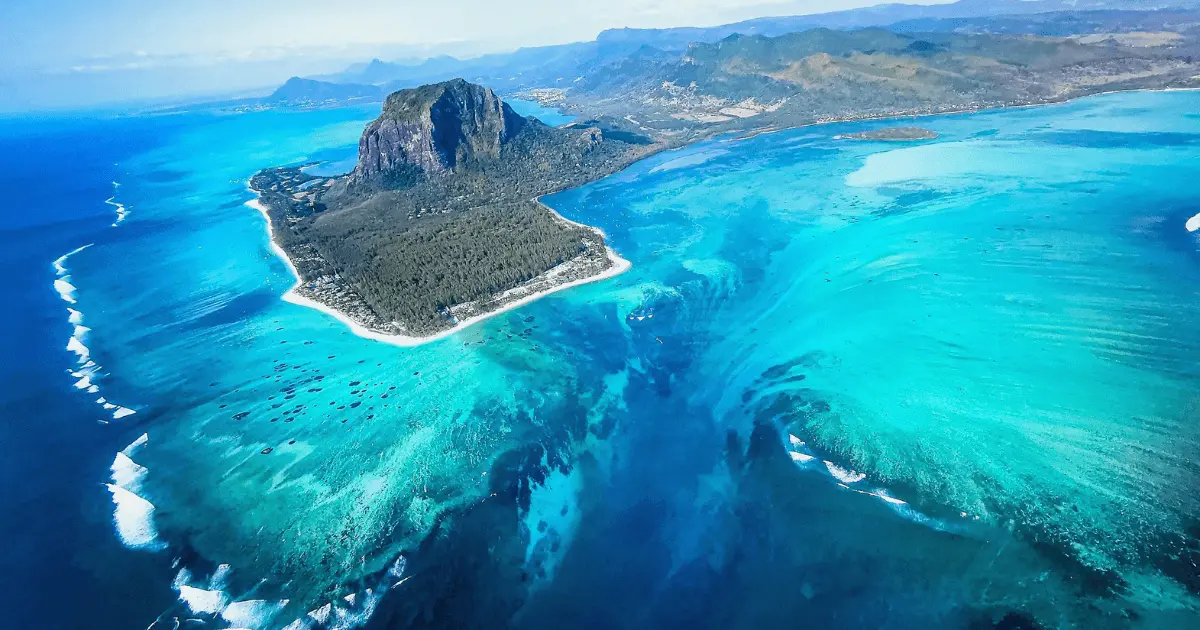
Mauritius offers a Premium Visa program that stands out for its accessibility, requiring no fees or proof of income.
This visa, lasting for one year, is open to individuals owning location-independent businesses or working remotely for companies outside Mauritius.
Mauritius boasts stunning landscapes, including beaches, jungles, and mountains, and offers Indian curry delights. The cost of living is moderate, with reasonable internet speeds.
Capital: Port Louis
Language: Mauritian Creole, French and English
Visa Cost: Free
Income Requirements: $1,500 per month
Visa Length: 1 year
Visa name: Premium Travel Visa
Cost of living index: 41 – (81 out of 140)
Internet: 27.58 Mbps
44. Cape Verde (Cabo Verde)
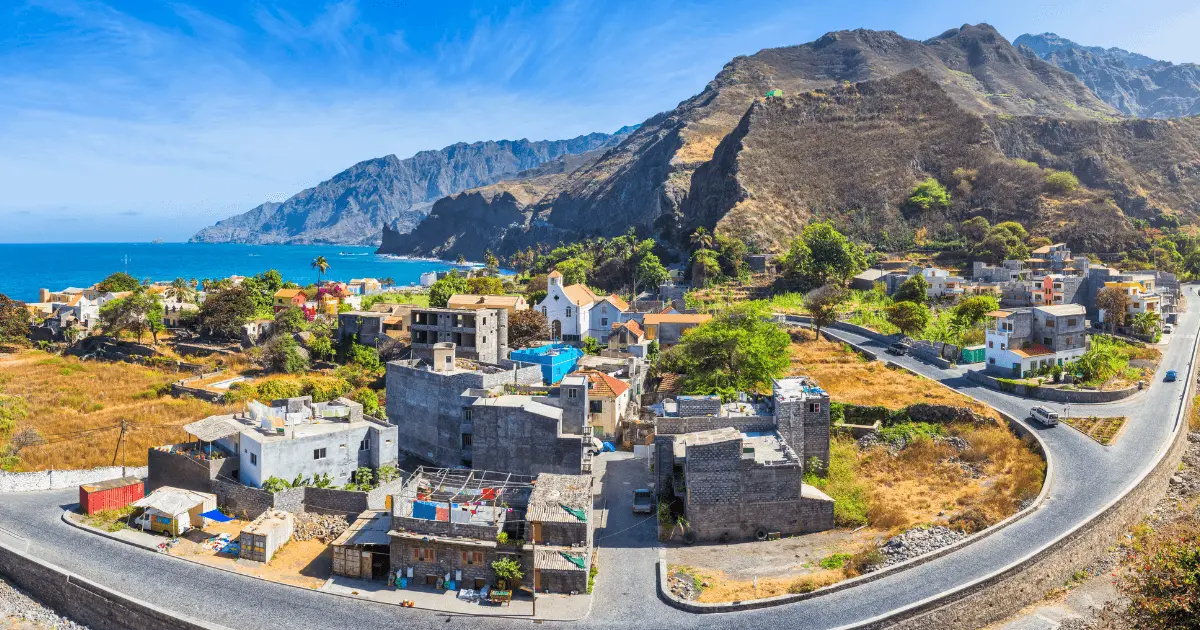
Cape Verde, an Atlantic Ocean archipelago, unveils its Remote Working Cabo Verde program, which is open to applicants from Europe, North America, and various African regions.
Visa fees include a €20 visa fee and a €34 airport fee. The visa allows for a 6-month stay, with an option to renew for another 6 months.
Income requirements are €1,500 per month for individuals and €2,700 per month for families. Cape Verde offers a cost of living similar to Cyprus and Greece, with modest internet speeds.
Capital: Praia
Language: Portuguese
Visa Cost: €20 Visa fee, €34 Airport fee
Income Requirements: €1,500 per month Individual, €2,700 per month family
Visa Length: 6 Months, renewable for an extra 6 months.
Visa name: Remote Working Cabo Verde program
Cost of living index: N/A
Internet: 14.6 Mbps
45. Seychelles
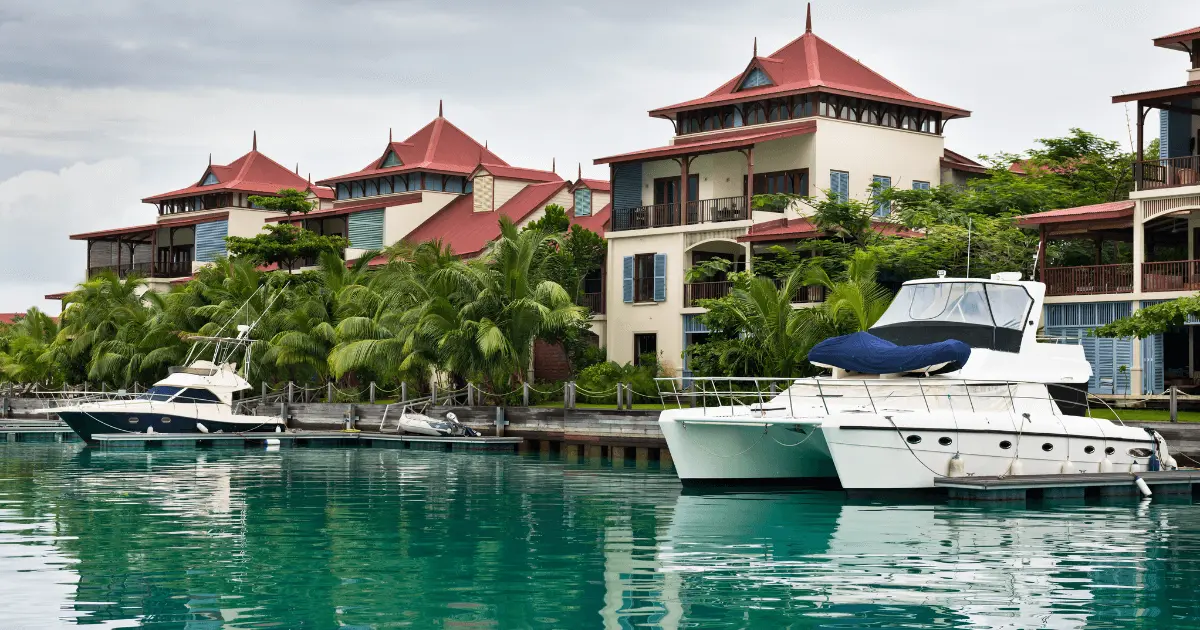
Seychelles introduces the Seychelles Workation Program, offering a straightforward application process. Requirements include a valid passport, proof of employment or business ownership, and proof of income or wealth.
The visa costs €45 per person and provides a 12-month stay.
Specific income requirements were not disclosed. Seychelles’ cost of living is similar to France, with reasonable internet speeds.
Capital: Victoria
Language: English, French, Seychellois
Visa Cost: €45
Income Requirements: Unknown
Visa Length: 1 year
Visa name: Seychelles Workcation Program
Internet: 26.64 Mbps
46. Uruguay
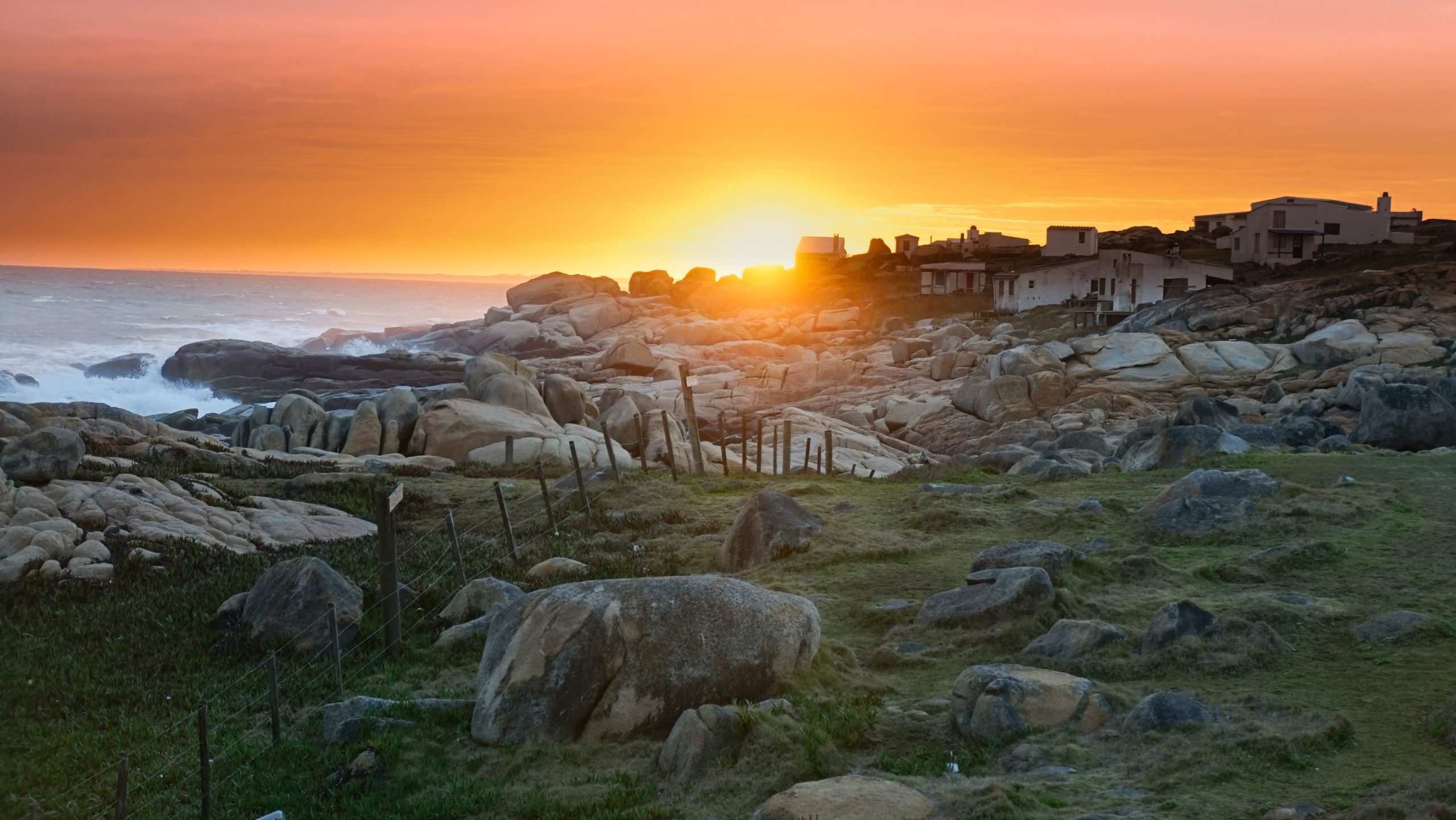
Centered in the heart of South America, this country has emerged as an enticing destination for digital nomads.
It is known for its stunning beaches, vibrant cities and a progressive approach to remote work. The country offers a digital nomad visa that promotes a flexible lifestyle.
Regulatory improvements have been an important factor in attracting significant numbers of digital nomads to Uruguay.
Capital: Montevideo
Language: Spanish
Visa Cost: $11
Income Requirements: None
Visa Length: 6 to 12 months
Visa name: Digital nomad visa
Cost of living index: 61 – (31 out of 140)
Internet: 32.87 Mbps
47. Namibia
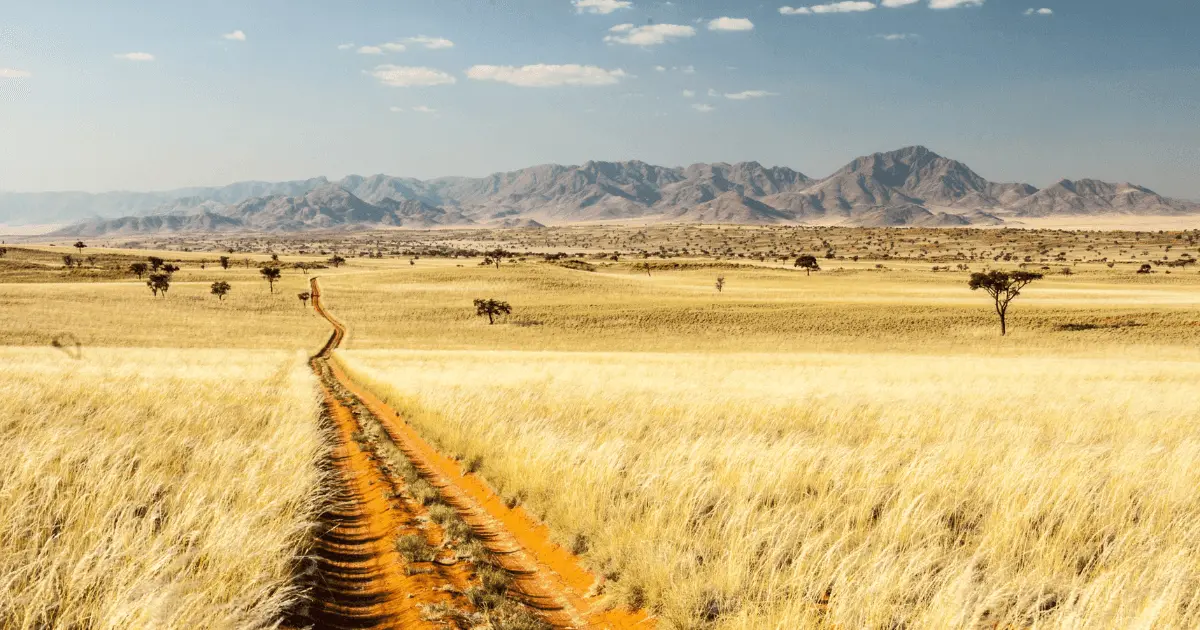
Namibia becomes the first mainland African country to offer a digital nomad visa, which requires a modest monthly income of $2,000.
The visa costs $62 per person and grants a 6-month stay, providing ample time to explore the nation’s stunning national parks and landscapes.
Income requirements monthly are $2,000 for the applicant, $1,000 for an accompanying spouse, and $500 per accompanying child. Namibia’s cost of living is moderate, with decent internet speeds.
Capital: Windhoek
Language: English
Visa Cost: $62
Income Requirements: $2,000 per month
Visa Length: 6 months
Visa name: Digital Nomad Visa
Cost of living index: 31.4 – (112 out of 140)
Internet: 8.49 Mbps
48. North Macedonia
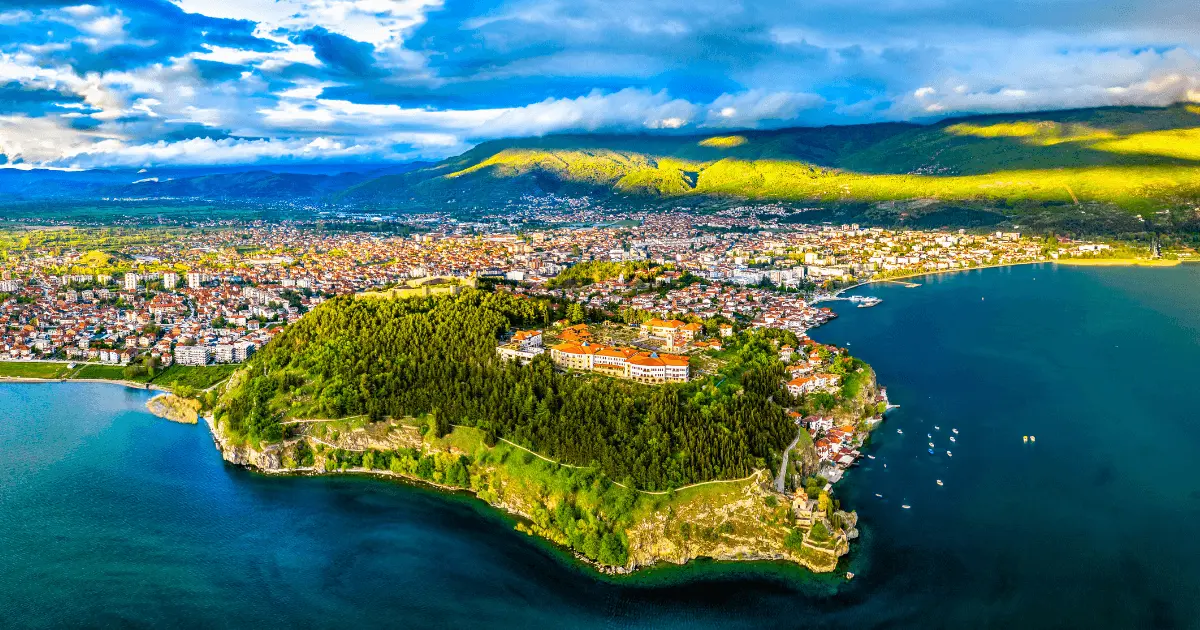
North Macedonia, a former Yugoslav nation, is in the process of developing its own Digital Nomad Visa. While details are scarce, it aims to provide opportunities for digital nomads with a moderate cost of living and good internet speeds.
Capital: Skopje
Language: Macedonian
Visa Cost: Not yet announced
Income Requirements: Not yet announced
Visa Length: Not yet announced
Cost of living index: 32.5 – (107 out of 140)
Internet: 32.42 Mbps
49. Serbia

Serbia offers a digital nomad visa allowing a one-year stay, although it requires a relatively high monthly income of €3,500.
In the meantime, Serbia offers a tax break exempting digital nomads from taxation for the first 90 days of their stay. The cost of living in Serbia is moderate, with decent internet speeds.
Capital: Belgrade
Language: Serbian
Visa Cost: Unknown
Income Requirements: $3,500 per month
Visa Length: 1 year
Cost of living index: 40.5 – (83 out of 140)
Internet: 64.31 Mbps
50. Montenegro
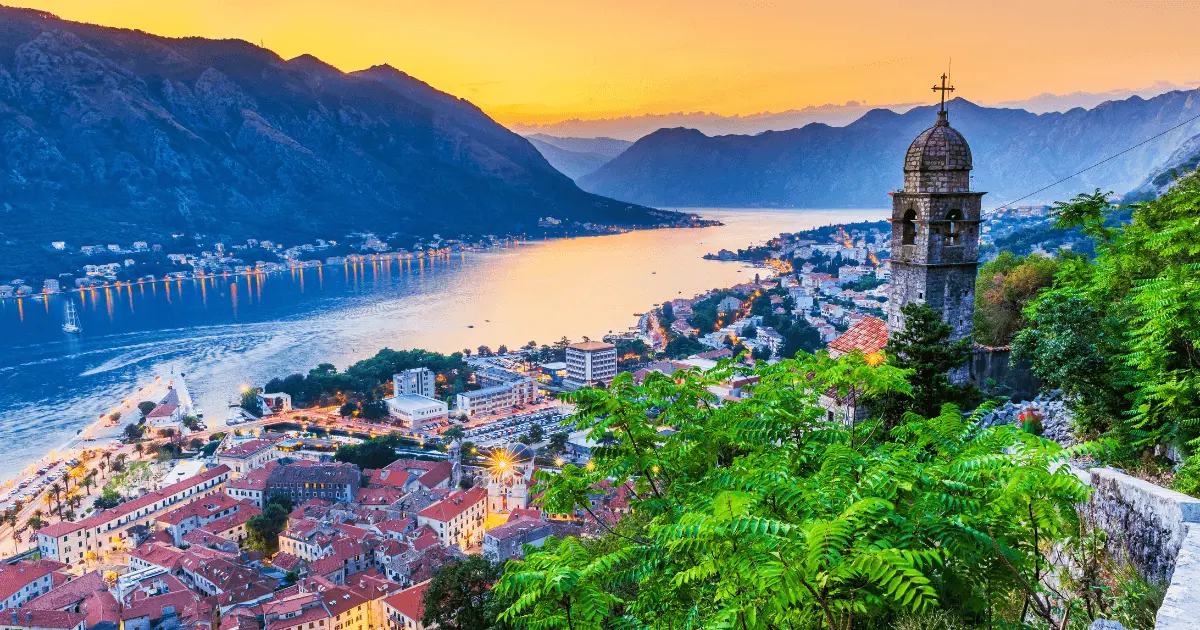
Montenegro launched its own digital nomad visa in Q1 of 2022, although details remain limited.
The Balkan nation offers a moderate cost of living with good internet speeds.
Visa Cost:
Income Requirements:
Visa Length:
Visa name:
Cost of living index:
Internet:
51. Indonesia – Bali

Bali, Indonesia, a popular destination for digital nomads and yoga enthusiasts, has been discussing the possibility of a 5-year digital nomad visa.
The island already attracts remote workers, and with the potential new visa, digital nomads may have more extended stay options. Visa costs and income requirements are unknown.
However, Bali offers a moderate cost of living with decent internet speeds.
Capital: Jakarta
Language: Indonesian
Visa Cost: $295 to $650
Income Requirements: proof of funds of $140,000
Visa Length: 60 days and up to 180 days
Visa name: Visit Visa B211A
Cost of living index: 30.8 – (115 out of 140)
Internet: Average download speed of 26.38 Mbps
52. Italy

In March 2022, Italy’s digital nomad visa was formally approved into law. Currently, there isn’t much information yet on the details of this digital nomad visa. However, it is primarily intended for non-European Union digital nomads or highly skilled remote workers who operate independently or for a company based outside the territorial boundaries of Italy.
Capital: Rome
Language: Italian
Visa Cost:
Income Requirements:
Visa Length: 1 year which is renewable
Visa name: Digital Nomad Visa
Cost of living index: 61 – (32 out of 140)
Internet: 63.54 Mbps
53. Spain

In January 2023, Spain introduced its Digital Nomad Visa as a part of the new Startup Act. This act comprises a set of measures aimed at fostering entrepreneurship and attracting foreign investments. Spain’s low cost beaches, mountains and vibrant cities like Barcelona, Madrid and Valencia has become a preferred destination for remote-working individuals.
Capital: Madrid
Language: Spanish
Visa Cost: $265
Income Requirements: $2,215 per month
Visa Length: 1 year and renewable for up to 4 more years
Visa name: Digital nomad visa
Cost of living index: 46.1 – (65 out of 140)
54. South Korea

Its culture has gained global popularity, courtesy of K-pop and K-drama. However, these factors are not the only reasons why digital nomads are interested in visiting.
The country’s appeal extends from its high-speed internet connectivity to its commitment to security, offering a multifaceted attraction.
The Working Holiday Visa is the closest thing to a digital nomad visa that you can get there. You can explore the country for up to one year and work while there.
Capital: Seoul
Languages: Korean
Visa Cost: $54
Income Requirements: $2,276.25
Visa Length: 1 year
Visa name: Working Holiday Visa
Cost of living index: 69.2 – (19 out of 140)
Internet: 142.64 Mbps
55. Argentina
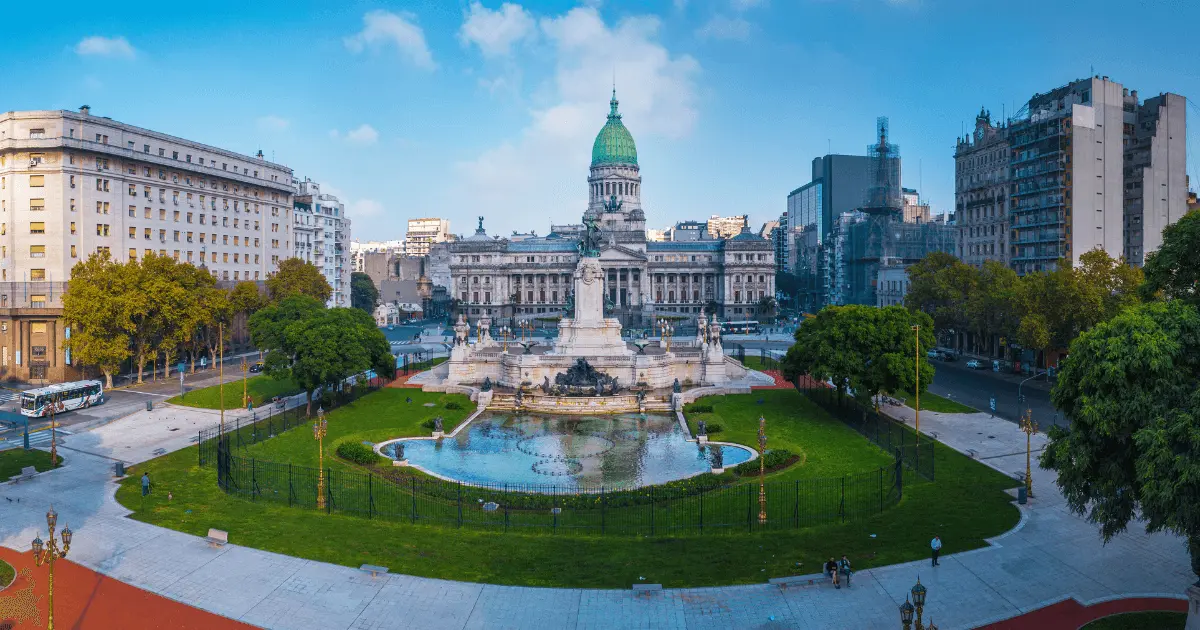
Argentina, already a favorite among digital nomads due to its accessibility and low cost of living, is working on a dedicated digital nomad visa. Currently, Argentina has a rentista visa for individuals with passive income. Argentina maintains a low cost of living index and moderate internet speeds.
Capital: Buenos Aires
Language: Spanish
Visa Cost: N/A
Income Requirements: $2,500 per month
Visa Length: 180 days renewable for an additional 180 days
Visa name: Digital Nomad Visa
Cost of living index: 30.3 – (118 out of 140)
Internet: Average download speed of 142.64 Mbps
56. France

A stunning nation that ranks among the most sought-after European destinations that receives millions of global tourists annually. France is renowned for its influence on fashion, music, art, and cuisine, and stands out as a trendsetting cultural hub. The country’s profound history and vibrant culture offer a captivating experience for digital nomads seeking to immerse themselves in its wonders. Though a France digital nomad visa is not available yet, the country has an option called “The Long Stay Visa”. This visa allows remote workers to establish their residence and work from France. France offers an opportunity for remote workers engaged in industrial, manufacturing, handcraft, agriculture, or new development sectors.
Capital: Paris
Language: French
Visa Cost: $106
Income Requirements: €615 per month
Visa Length: 1 year
Visa name: The Long Stay Visa
57. Japan

The country is determined to restore its tourism figures to pre-pandemic levels and has identified digital nomads as a target group to attract. While details are forthcoming this year 2023, Japan’s Digital Nomad Visa is a work in progress. Japan has a moderate cost of living index and excellent internet speeds.
Capital: Tokyo
Language: Japanese
Visa Cost: N/A
Income Requirements: N/A
Visa Length: N/A
Visa name:
Cost of living index: 54.3 – (43 out of 140)
Internet: 146.79 Mbps
58. Philippines

It joined the global trend of attracting digital nomads with the passage of the Digital Nomad Act on June 14, 2023. This is aimed at providing a 12-month visa, extendable for an additional year, to remote workers employed outside of the Philippines who meet specific income criteria. Full details of the Philippines digital nomad visa is yet to be released though.
Capital: Manila
Language: Filipino and English
Visa Cost: Not yet announced
Income Requirements: $24,000 per year
Visa Length: 1 year
Visa name: Digital Nomad Visa
Cost of living index: 35.9 – (95 out of 140)
Internet: 90.03 Mbps
Advantages of Digital Nomad Visa
Embracing the digital nomad lifestyle offers a multitude of advantages that make it an appealing choice for many individuals:
- Full-Time Travel Opportunity: One of the most enticing perks of the digital nomad lifestyle is the freedom to travel full-time. It liberates you from the confines of a fixed physical workspace while allowing you to explore the world according to your preferences.
- Flexibility in Work Arrangements: Digital nomad visas often come with provisions that enable individuals to work for multiple employers or clients while residing in the host country. This flexibility empowers you to diversify your work portfolio and explore various opportunities.
- Reduced Travel Stress: Digital nomad visas eliminate the need for constant entry and exit from a country. This streamlines the logistical aspects of frequent travel, reducing stress and administrative hassles.
- Cultural Immersion: Living and working in a new country immerses you in different cultures, languages, and lifestyles. This firsthand experience enriches your personal growth by broadening your horizons and fostering cultural appreciation.
- Enhanced Work-Life Balance: Digital nomads often enjoy greater control over their work schedules. This autonomy allows you to strike a more harmonious balance between your professional commitments and personal life, ultimately leading to improved overall well-being.
- Personal Growth: Traveling and working in diverse environments can catalyze personal growth. It cultivates adaptability, resilience, and a broader worldview, contributing to your personal and professional development.
Disadvantages of Digital Nomad Visa
While a digital nomad visa can offer numerous advantages, there are also some downsides to consider:
- Work-Life Balance Challenges: Striking a healthy work-life balance can be tough. Remote workers may struggle to disconnect from work, especially when living in a foreign environment that blurs the boundaries between work and personal life.
- Language Barriers: Living in a foreign country where you don’t speak the language can present difficulties, particularly when dealing with administrative tasks or unexpected emergencies. Overcoming language barriers can be a persistent challenge.
- Legal and Cultural Complexity: Navigating the legal and cultural differences of each host country can be complex. It requires a high level of adaptability to adhere to local laws and customs, which can vary significantly from one place to another.
- Social Isolation: Constantly changing locations can lead to social isolation. The transient nature of the digital nomad lifestyle can make it harder to establish long-term friendships and meaningful relationships, as you’re frequently on the move.
Conclusion
In conclusion, the world of digital nomadism is continuously evolving, and the emergence of digital nomad visas in numerous countries reflects this dynamic trend. Whether your motivation is to change your surroundings, immerse yourself in diverse cultures, or relish the freedom to work from anywhere, the extensive list of 59 digital nomad visa countries offers a plethora of choices for you to consider. As you set out on your journey as a digital nomad, it’s essential to diligently research each country’s specific requirements and conditions. Embrace the adventure and seize the opportunities that accompany this exhilarating way of life. Here’s to a future filled with fulfilling travels and exciting digital nomad experiences! Safe travels and may your digital nomad adventures be truly transformative!
Frequently Asked Questions on Digital Nomad Visa
What is the cheapest country to live for digital nomads?
One of the primary considerations for young digital nomads is whether they can enjoy themselves in a particular location without breaking the bank. It’s important to note that not all countries offer the same level of affordability and entertainment options, but we’ve compiled a list of the top destinations that excel in both aspects.
1. Mexico
At the top of our list is Mexico, a country that not only offers an affordable cost of living but also a rich array of entertainment options. Mexico boasts diverse attractions, from the pristine beaches of Cancun to the vibrant hub of Mexico City.
2. Indonesia
Another enticing choice is Indonesia, where the cost of living is even lower than Thailand. Ideal for budget-conscious digital nomads, Indonesia is celebrated for its stunning locales, including the famous Bali. The nation presents an abundance of delectable cuisine and amiable residents. Additionally, Jakarta, its largest city, features numerous co-working spaces and reliable internet connectivity.
3. Romania
For those desiring proximity to Europe, Romania beckons as an affordable and enjoyable Eastern European gem. With living expenses estimated at 64% lower than the UK, Romania caters to budget-conscious digital nomads.
4. Colombia
Finally, our last pick is Colombia, a South American treasure teeming with beauty. And beyond being cost-effective (with a cost of living 55.5% cheaper than the UK), Colombia boasts a robust infrastructure for co-working spaces and internet connectivity, making it an ideal destination for digital nomads to work and reside. It’s also an excellent place to learn Spanish.
What are the requirements for a digital nomad visa?
A. Digital Nomad Visa Application Process
B. Digital Nomad Visa Documents Required
C. Document Guidelines
A. Digital Nomad Visa Application Process
Here are some guidelines you need to follow to process your visa:
- Fill Out The Application Form
- Set an Appointment With an Embassy or Consulate
- Prepare Your Documents
- Submit Your Application
- Fill Out The Application Form
You need to fill out the digital nomad visa application form as per the instructions. Some countries require you to fill out the application online and then print it out and sign it, while others require you to fill out the form at the embassy or consulate physically. Please note that you have to provide all accurate information with your up-to-date details.
1. Set an Appointment With an Embassy or Consulate
You also have to locate a visa office which can be either an embassy or consulate— keep in mind that an embassy and consulate are not the same institutions. Depending on your country of residence, you may be required to apply at a neighboring embassy. Nevertheless, once you locate your visa office, you have to schedule an appointment to submit your application and attend the visa interview.
2. Prepare Your Documents
After you fill out your application, you have to prepare the rest of your required documents. You may have to translate some of your documents or certify them with an apostille stamp.
3. Submit Your Application
When you get your documents ready, submit them with your filled-out visa application to the embassy. You also have to attend the visa interview and pay the visa fee— some countries require you to pay the fee beforehand and submit the receipt as a part of the application documents..
B. Digital Nomad Visa Documents Required
To initiate your digital nomad visa application, you must prepare the following essential documents:
- Complete the digital nomad visa application form.
- Present your valid passport.
- Provide recent identity photographs.
- Furnish proof of comprehensive health insurance coverage.
- Demonstrate your financial stability, including the source and amount of your income.
- Substantiate your remote work status with evidence such as client contracts or a business license.
- Include essential civil documents like your birth certificate, CV, and qualifications.
C. Document Guidelines
To successfully apply for your digital nomad visa, ensure that your documents adhere to the following guidelines:
- Your passport should have a minimum validity of six months from the application date.
- When taking your identification photos, use a plain, white background, maintain a neutral facial expression, and refrain from any editing.
- If necessary, translate your civil documents and obtain certification with an apostille stamp.
How Long Does It Take to Get a Digital Nomad Visa?
Typically, the processing period for a digital nomad visa application spans approximately one month. However, it’s crucial to note that the processing duration may vary depending on the specific country’s immigration procedures and regulations.
How Much Does a Digital Nomad Visa Cost?
The expenses associated with obtaining a digital nomad visa can vary significantly, ranging from $200 to as high as $2,000. Notably, certain Caribbean nations such as Barbados and Antigua and Barbuda impose some of the steeper application fees for digital nomad visas.
Conversely, there are countries like Georgia that extend the privilege of a digital nomad visa at no cost, strategically aiming to attract a higher number of applicants.
Digital Nomad Visa Taxes
Different countries have varying approaches to taxation for digital nomads. Some nations may require you to pay standard full taxes on your income, while others might offer tax deductions or special reduced rates. Interestingly, there are countries that grant digital nomads a tax haven by imposing zero taxes, under the assumption that you are still fulfilling your tax obligations in your home country.
It’s important to note that in most cases, you’ll be expected to maintain private health insurance, and you may not be required to contribute to the host country’s social security system. The tax landscape for digital nomads is multifaceted and can differ significantly from one location to another.
Digital Nomad Visa Denial
There are several grounds on which your digital nomad visa application may be declined:
- Previous conviction of a significant criminal offense.
- Lack of a suitable remote work opportunity.
- Submission of an application with inaccurate information.
- Failure to meet the specified annual income threshold.
Related Articles You Might Be Interested In:
Free Guide: Digital Nomad Visa
2 visas you can use to relocate abroad with a job waiting for you on arrival, and tech skill you can use to secure that foreign job.
Simple tech skills to get foreign jobs with potential visa sponsorship


